#the boleyn tudor cromwell children
Note
wolf hall (book and/or miniseries)
the characterization of francis weston...i actually feel like his characterization would've fit henry percy better (described as "light and hasty"-- that diverts to another thing i'd change, it was disappointing that mantel got so much of him correct, like his debts, and yet left no room to mention percy was often the source of some of the more vicious rumors about anne...instead it's always someone close to her, her family, like anne shelton and jane boleyn, that have such low opinions of her); i won't quibble with him being spirited and perhaps even shallow and extravagantly spendthrift (he was extremely privileged and only 25 when he died, after all); but having him be just so unequivocally nasty as to call cromwell's literal deceased daughters (to his and his son's face...?) ugly as sin just seemed way too easy a justification. she'd already written him into the wolsey farce to explain why cromwell picked from the cast to condemn those men in 1536, that just felt like laying it on too thick.
the device of cromwell promising parents on the edge of death to look out for their children to explain his actions ran thin by the time it was used for mary in tmatl (at that time, the second time it was used, already for wyatt). mantel should have chosen one or the other. even more realistically, i think cromwell's protection of wyatt should have been explained in the same way his protection of the future exeter players was used: he wanted him in his debt, he wanted to call on favors in the future.
the portrayal and arc of mary boleyn...as another reviewer put it:
"In Wolf Hall as in The Other Boleyn Girl Mary is the only uncalculating Boleyn, the only artless person at the Tudor court. [...] Although Mantel’s prose has been justly praised, this indignant speech could have been lifted right out of The Other Boleyn Girl or any other Tudor bodice-ripper that would not have made the Booker Prize shortlist. It’s as if, when we get to the Boleyn women [...] we’re always on the same terrain. [...] The best historical fiction, embellishes, invents, and excludes so that we see the past, and our relation to it, in a new way. Mantel’s novel may change how we look at Sir Thomas More and Thomas Cromwell. But her depiction of Mary Boleyn is the same old story."
there were a lot of things in the book that didn't really translate into the adaptation of the tv series, that were either abridged or altered or completely absent. i would've liked to see the scene from bring up the bodies after catherine of aragon's death, where anne discusses her stepdaughter, or the one earlier, where she says she understands catherine, because she would fight for everything she has for her daughter, as well. neither of those were in the tv series. in my estimation, cromwell is more blorbofied in the tv series than the books...it's not given enough space, but there are lines that attest to his ruthlessness, the executions of the 'right' men in ireland, for example, that i don't recall being given any space at all in the tv series. we get a sense of his personal life more than his political life, almost, in the tv series.
13 notes
·
View notes
Text
OT3 Verse Headcast
So @onekisstotakewithme asked me this question from a meme:
🎬 If a movie or show were based on your fic, which fic would you choose and who would you fancast?
And listen I usually say ‘Jewish Anne Boleyn’ but I don’t actually know of any biracial Persian Jewish actors to cast for that so I thought I’d do my giant emotional support Tudors AU aka The OT3 Verse. See here for summary of. So I thought I’d write out (with pictures) all the headcasts I have.
PLEASE feel free to ask me about any of them and I will answer like I was a show runner giving an interview to a media outlet because DUH.
Under a cut because LONG.
The Triad

Natalie Dormer (Anne Boleyn)

James Frain (Thomas Cromwell)

Jonathan Rhys Meyers (King Henry VIII)
Boleyn Family

Rufus Sewell/Luke Thompson (Thomas Boleyn)

Joanne Whalley/Eleanor Tomlinson (Elizabeth Boleyn)

Jonathan Bailey (George Boleyn)

Morfydd Clark (Jane Boleyn)

Holliday Granger (Mary Boleyn) because @houseofborgia in part because I think she would rock OT3 verse Mary.
Dudley Family

Matthew Goode (John Dudley)

Tom Blythe (Robert Dudley)
(Jane Dudley is obviously here but placeholder for now because stuck on headcast)
Children Of The Triad (adults)
Princess Mary (Sarah Bolger)
Princess Elizabeth (Sophie Turner)
Prince Thomas (Patrick Gibson)
Prince George (Ethan Peck)
Prince William (Ruari O’Connor)
Princess Margaret (Lola Petticrew)
Prince Owen (Ben Barnes)
Prince Edmund (Kerem Busin is the best visual representation I have but honestly like picture Travis Kelce with red hair and Giant)
Princess Philippa (Goldshifteh Farahani)
Other Major Characters
Princess Mihrimah/Mihrimah Sultan (I go between Sujaya Dasgupta for VIBES and because I think she’d kill it and Pelin Karahan)
John Welles, Earl of Norwich (Rupert Graves)
Thomas Howard, Duke Of Norfolk (Jeremy Irons)
Bridget Grey, nee Talbot (Hannah New)
Lionel Grey (Toby Regbo)
Charles Brandon, Duke of Sussex (Henry Cavill)
Mary Brandon, Duchess of Sussex (Debra Messing thank you @the-ships-to-rule-them-all so much for suggestion 🩷)
(I do also have the grandchildrens generation but that’s WAY TOO MUCH)
12 notes
·
View notes
Note
Hi there,
I noticed you've been following me for awhile thanks. I saw some of your posts on the Howards and noticed that you mentioned somewhere that the Duke of Norfolk might have played a part in Cromwell's downfall in 1540 in order to get revenge for Anne Boleyn's execution.
That's a very interesting theory and I like it. Is there much evidence for any affection Norfolk or the other Howards had for Anne? I've always seen Norfolk as an evil villain who treated his family badly but maybe there was more to him than that?
Hello.
Sorry it's taken such a time to respond, but as you'll see it's VERY long, so I wouldn't start reading this on the bus.
Part One
As a child I used to be very annoyed by 20th-century writers treating historical figures like ice-cold robots welded to lifeless 'logic', and incapable of doing anything rash or ridiculous.
Oh why would Richard kill the Princes when it'd make him look bad?!
See? It must've been a plot by Margaret Beaufort all along.
(I know it's improved since then, but that first impression stuck.)
Reading history, I've always assumed family members instinctively cared for one another, unless their words and actions proved otherwise, and yet the above mentality pushed the exact opposite: that it was 'irresponsible' to even suggest any sort of natural bond between relatives unless they actually wrote it down, which is an absurd standard.
To me it's as silly as saying 'we don't know' if they breathed air as no one put it in a diary.
What does it matter how long ago they lived? They're still people.
I've even seen the extremely smug attitude that caring about one's own children is entirely a 'modern' invention, and the Mediæval and Tudor age wouldn't have understood such a concept.
Wouldn't have understood love!
Since then I've been interested in emotional bonds between friends and family, given how much closer they were than now, particularly rebelling against the idea Elizabeth didn't care about Anne.
And the Boleyns / Howards are my favourites, so their clannish level of kinship fascinates me the most.
Let's go through some of them:
Catherine Howard, Countess of Bridgewater
Catherine's first husband was Rhys ap Gruffydd, heir of a powerful Welsh family.
Problem was when his grandfather died Rhys got passed over (I expect because he was seventeen) in favour of Walter Devereux (the 10th Baron Ferrers), and Rhys wasn't 'avin that.
Devereux arrested him for disturbing the peace, which sent Catherine bananas as she'd convinced herself they were all out to get her husband.
In response she stirred up the local gentry and marched on Carmarthen Castle, threatening to burn the door down and bust on in there if Rhys wasn't freed.
Well after that unease and bitter factionalism bubbled up to denonation point, with servants killed on either side and Catherine attacking and destroying Devereux's property, meaning he sent word to England descibing BOTH of them as leaders of a 'rebellion and insurrection'.
Rhys sounds like a knob to me. You could say Henry caused this mess in the first place, but Rhys ought to have known where all this was leading.
His Wiki page lays it on that he was some noble folk hero martyred to the Reformation, but adding 'FitzUrien' to his name, thereby playing on ancient Welsh myths and thus (supposedly) announcing himself as Prince of Wales, was pushing his luck to say the least.
That's a worse blunder than Henry Howard made and no one ever feels sorry for him.
I shouldn't think he had conspired with James V, but going by this quote from the chronicler Elis Gruffudd (a very interesting fella in his own right) he wasn't universally mourned:
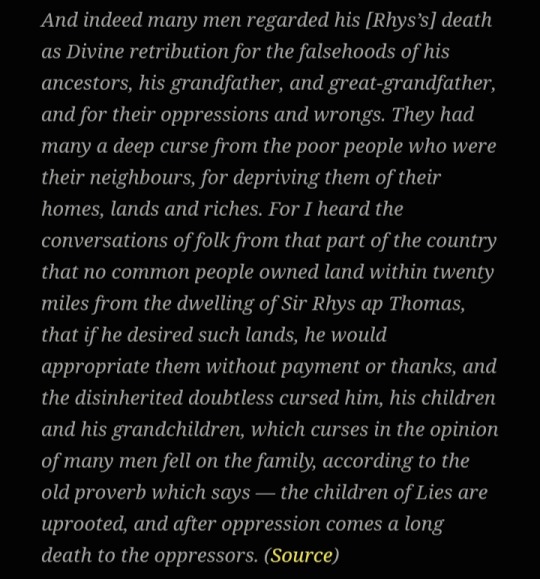
Rhys was beheaded in 1531, but Catherine was in the soup herself after all she'd been up to assisting him.
As Gareth Russell says:
'While we may never know exactly how much his own actions brought about Rhys's death, we can be certain of the devastating effect it had on his widow. She had been intimately involved in her husband's quarrel, and so the possibility that she would be accused of complicity in his alleged treason was tangible.
Left to forge prospects for their three young children — Anne, Thomas and Gruffydd — and fearful for herself, Lady Katherine followed in the footsteps of her elder brother Edmund and flung herself on the mercy of their niece, Anne Boleyn. Once again, the family's dark-eyed golden girl did not disappoint.'
It notable how often you see Anne, and later Elizabeth, willingly pull relatives out of sticky situations, which suggests at least some previous attachment on both sides, as I shouldn't imagine either would be too happy doing it for the more hostile characters.
Compare Katherine's reliance on Anne, a half-niece, to Elizabeth Seymour writing to Cromwell for help, not Jane, her own sister.
'She may even have tried to limit the damage for her aunt and young cousins shortly before Rhys's execution.'
Which was good of Anne considering Rhys had slagged her off, with both of those links having the nerve to imply his death was somehow her doing.
Had he lived, I do wonder if his opposition, compared to Catherine, who, familiarity or not, no doubt wanted to benefit from the connection, would've provoked a certain marital discord.
'Rhys had been attainted at the time of his conviction, meaning that the Crown could seize his goods and property, but his Act of Attainder specifically and unusally made provisions for his widow, who was left with an annual income of about £196.
If Anne could not save Rhys, she worked hard to salvage his family's situation.'
Meaning she got Henry to surrender some of his ill-gotten gains solely to avoid her aunt's destitution, where plenty of other widows and orphans were left to fend for themselves.
Anne also got Catherine a new husband in old-timer Henry Daubeney, but they bloody hated each other and split up soon enough.
According to Eric Ives:
'Over the winter of 1535-6, Katherine Howard, Anne's aunt, was trying to secure a separation from her second husband, Henry, Lord Daubeney. She told Cromwell that the only assistance she was receiving was from the Queen herself, and this despite the strenuous efforts which were being made to destroy her standing with Anne.
The help may have been very practical indeed; Lord Daubeney, who was certainly pleading financial hardship at one stage, reached an amicable agreement with his wife after Anne's father had made available £400.'
Even though this post about Catherine insists neither Anne nor Norfolk gave a toss about her personal woes, from the looks a things Anne was trying to solve this problem too.
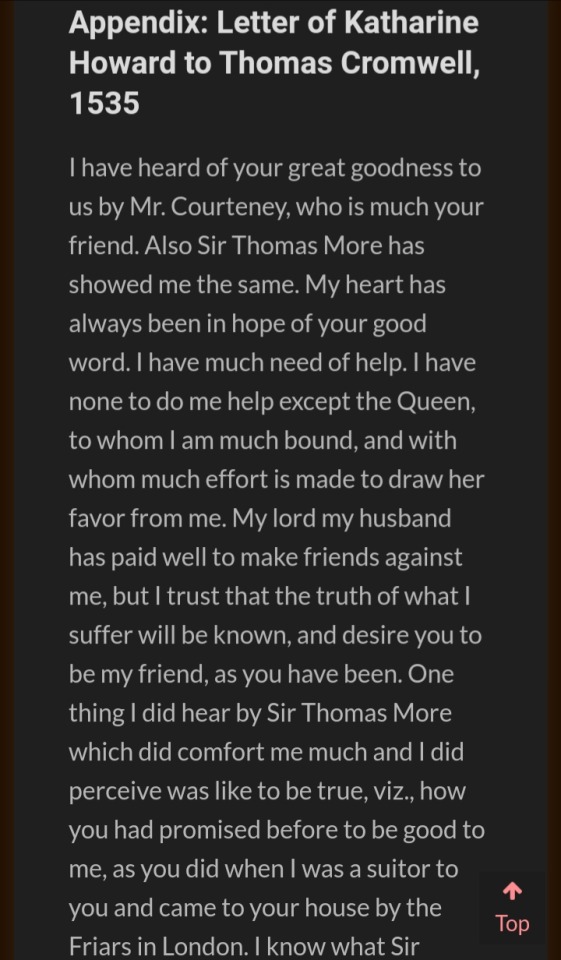
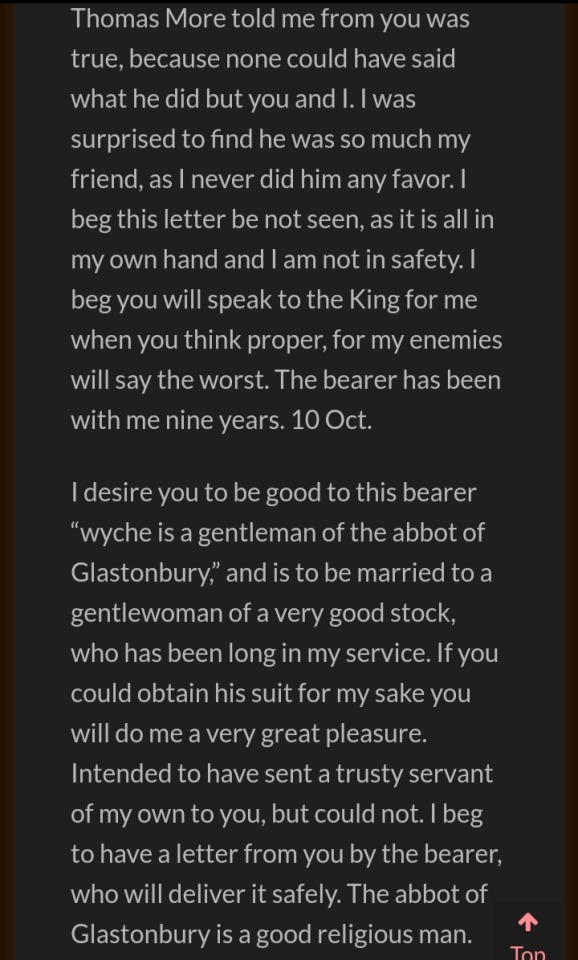
'I have none to do me help except the Queen, to whom I am much bound, and with whom much effort is made to draw her favour from me.
My lord my husband has paid well to make friends against me, but I trust that the truth of what I suffer will be known...'
One wonders how all these paid agitators ended up gathered 'round Anne, nagging or distracting her from Catherine's cause, but evidently she wasn't put off.
Plus, according to that last link, Catherine never learnt her lesson and took part in the Pilgrimage of Grace an' all, raising 3,000 men against Henry!
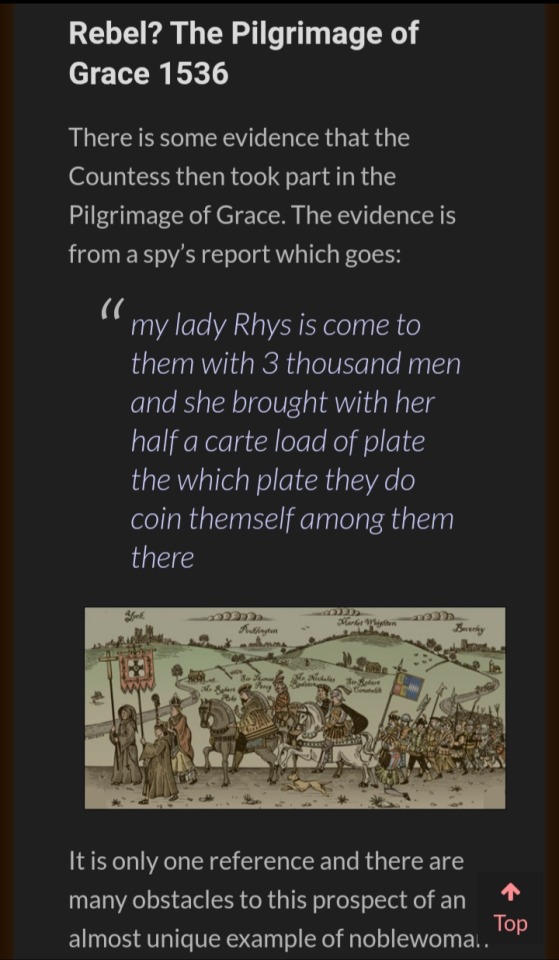
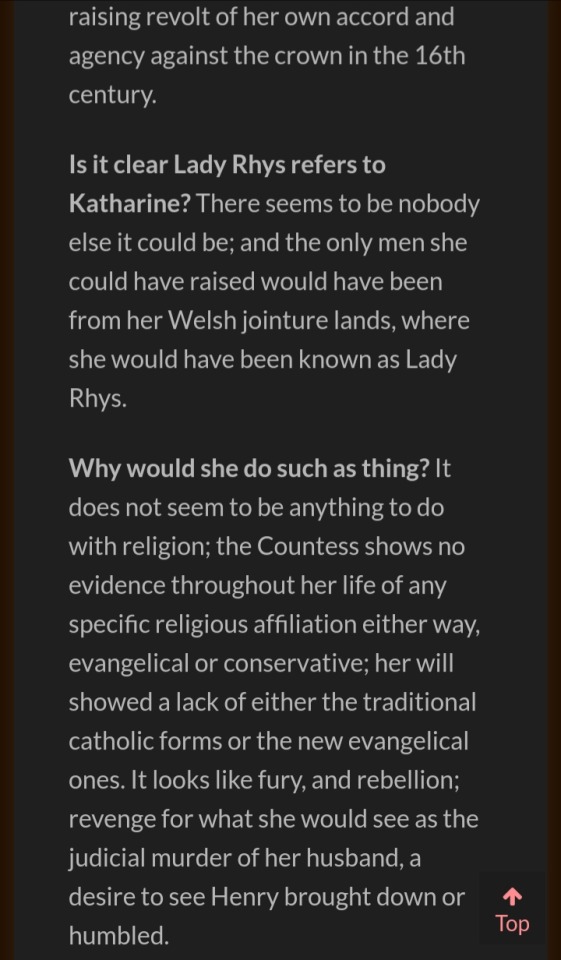
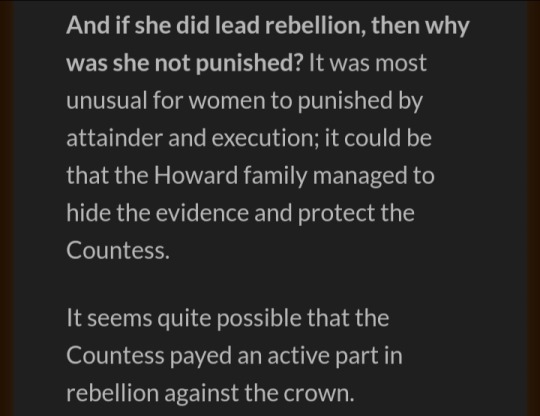
By the sounds of it, this isn't a sudden burst of furious piety at work, rather there's almost an absence of religion in Catherine's life.
The obvious explanation would be yet again wreaking vengeance in Rhys's memory, and that's evident given her long-standing vendetta against his disloyal servants.
But would it be too much to think she was motivated to a certain extent by the death of her niece and nephew, being 'much bound' to the former?
And as she avoided all punishment, the remaining Howards (i.e. Norfolk) had to have covered up for her.
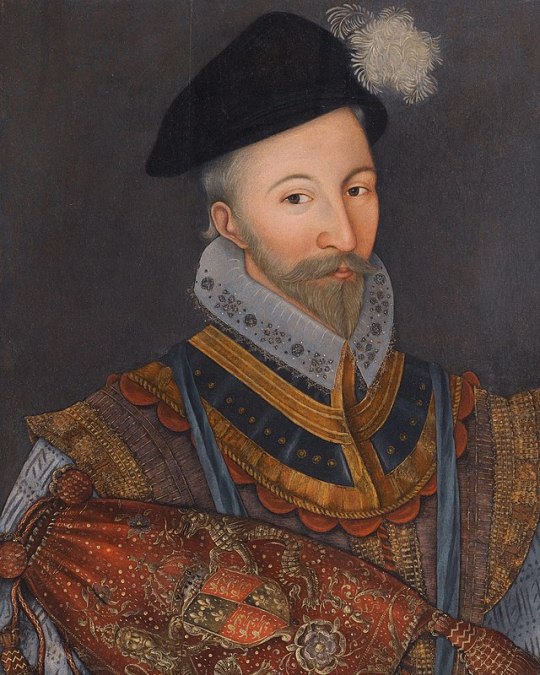
William Howard, 1st Baron Howard of Effingham
In 1529 there was much scrapping over the wardship of the Broughton sisters.
Wolsey ended up with the younger, Katherine, but upon his fall it seems Anne got the girl transferred to the care of Agnes Tilney, who then married her to William, so Anne was responsible for his first marriage.
(Not that it prevented Katherine Broughton from acting, as Ives puts it, as 'ringleader', in a demo for Mary six years later, and getting herself locked up in the Tower as a result, but there you go.)
Given the amount of important roles he enjoyed during Anne's queenship, all whilst barely out of his teens, she must have liked him:
• 1531: Ambassador to Scotland.
• 1532: Travelled to Calais with Anne to meet Francis.
• 1533: Served as Earl Marshal during Anne's coronation, in place of Norfolk.
• 1533: Held the canopy at Elizabeth's christening.
• 1535: Visited Scotland to award the Order of the Garter to James.
• 1536: Went again to Scotland to arrange a meeting between Henry and James.
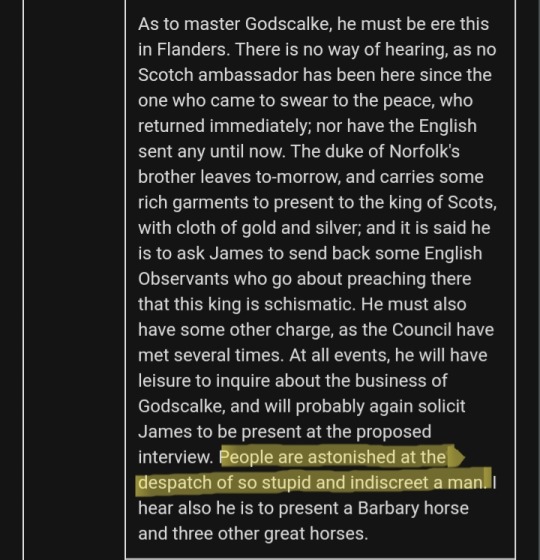
Besides, Chapuys said of him:
'People are astonished at the despatch of so stupid and indiscreet a man.'
So he had to be Anne's friend.
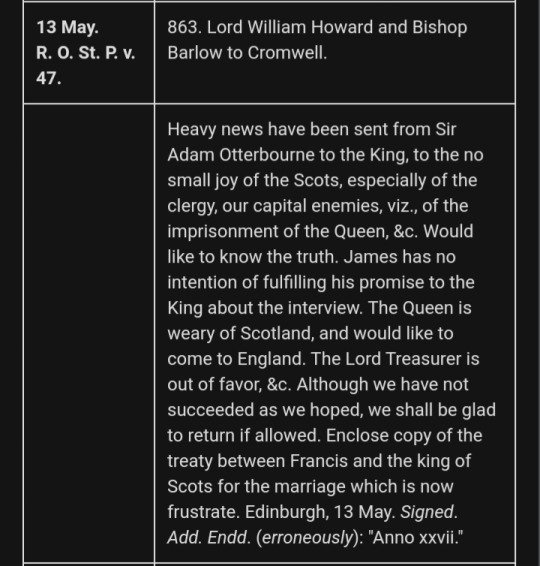
Once he hears of her arrest, William curses it as 'heavy news', demanding to know the truth from Cromwell and resenting all the Scottish clergy as 'capital enemies' for rejoicing in her fall.
Mainly I'm mentioning him to discuss his own character, and where his evident loyalty to other family might give us a further suggestion of his relationship to Anne, and how he kept to that sense of honour even when it led him into dangerous territory.
Consider, for example, how he named his son Charles after his brother, and called his daughter Douglas in honour Margaret Douglas, Charles's wife, thus commemorating their doomed romance.
You'd also be surprised how often he turns up in Young and Damned and Fair, as he appears to have been Katherine's closest uncle, for all that she's usually connected to Norfolk.
Indeed, so deep was he in it Agnes had to be advised not to warn him off coming home, meaning he arrived from France and found himself immediately clapped in the Tower, whereupon he craftily claimed all his best plate was washed overboard so Henry couldn't get at it, which worked.
Later, his connection with Henry Howard ensured he missed out on being Admiral, and when he did get it, Mary took it off him to punish his partiality to Elizabeth.
There's a section here detailing his bond with Elizabeth, where he's credited with saving her life, if you ignore the obvious errors:
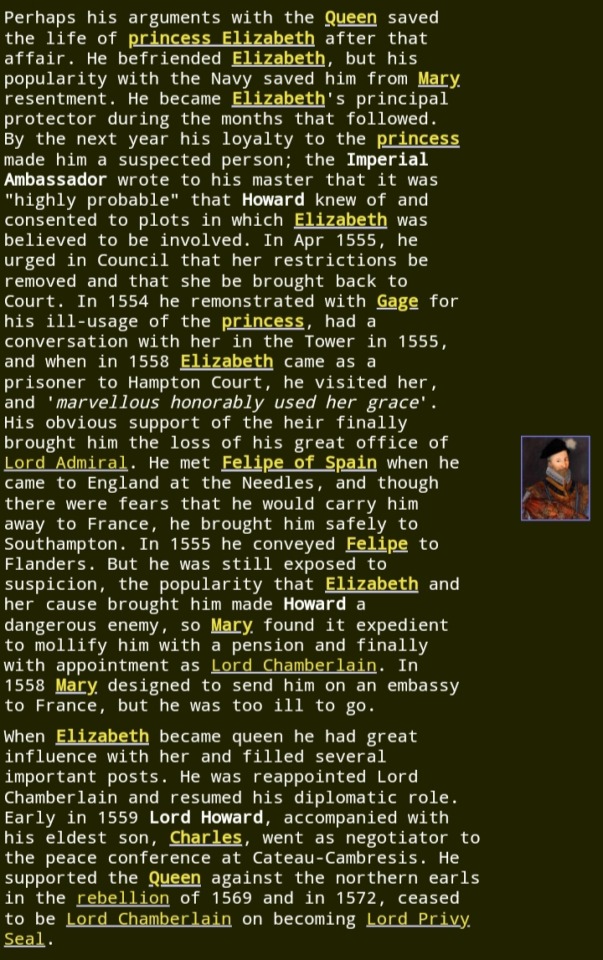
I especially like the idea everyone feared William would kidnap Philip!
However, there's a very odd paragraph in his son's Wiki page:
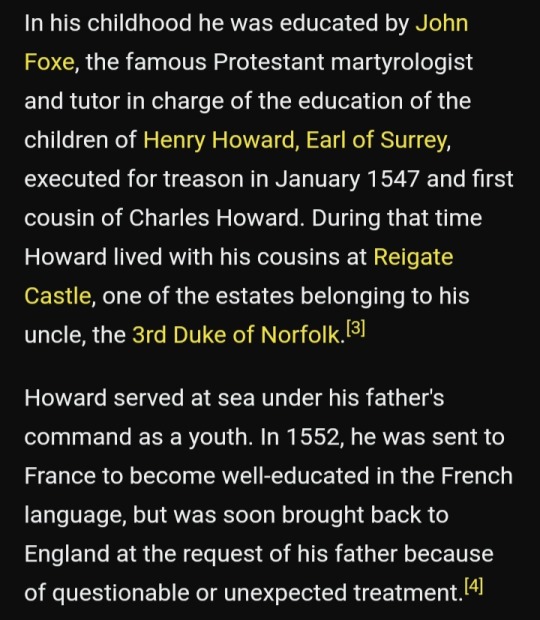
'In 1552, he was sent to France to become well-educated in the French language, but was soon brought back to England at the request of his father because of questionable or unexpected treatment.'
Am I mad or does this imply Charles Howard endured sexual abuse in his teens?
Were it only poor lodgings or sub-standard teaching, he could've moved elsewhere.
Were it excessive beating, you'd expect it to be made plain, not using all this cagey, obfuscating language.
But the thought did lead me to ponder their father-son bond, where Charles, whatever shame he suffered, knew he was loved enough that writing to his father would make it stop.
And William, reading it, rescued him immediately, proving the boy right.
This is a mere fancy of mine, but when it's just after Elizabeth's ordeal, whom he obviously cared so much about, and knowing she could easily have died like Katherine, which happened in part because he never stopped Dereham, one wonders if his moral failing then pushed him to protect Charles and Elizabeth later.
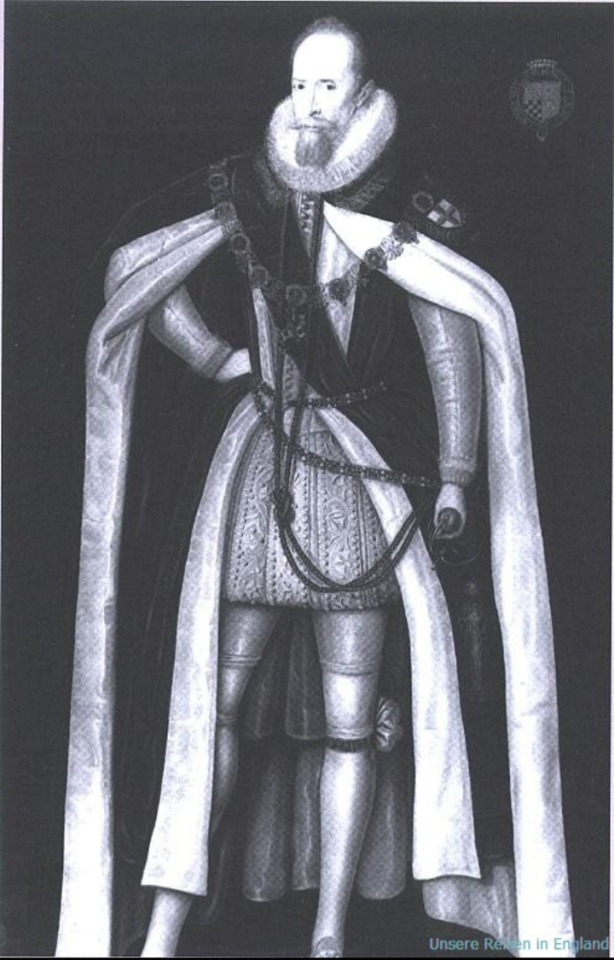
Thomas Howard, 1st Viscount Howard of Bindon
I'm hard-pressed to unearth much information on this lad, but everyone leaves him out so I won't.
There's gotta be some reason Elizabeth ennobled him, and so early on (in 1559) before he'd had the chance to serve her.
It can't just be she looked round the court, noticed he was the last of Norfolk's children, and awarded him for that.
I wish we knew more about Elizabeth's childhood, as in who she met and associated with at court, because you can be certain she met the Howards then.
I also want to add a little about his eldest son, the 2nd Viscount, who was...odd, to say the least:
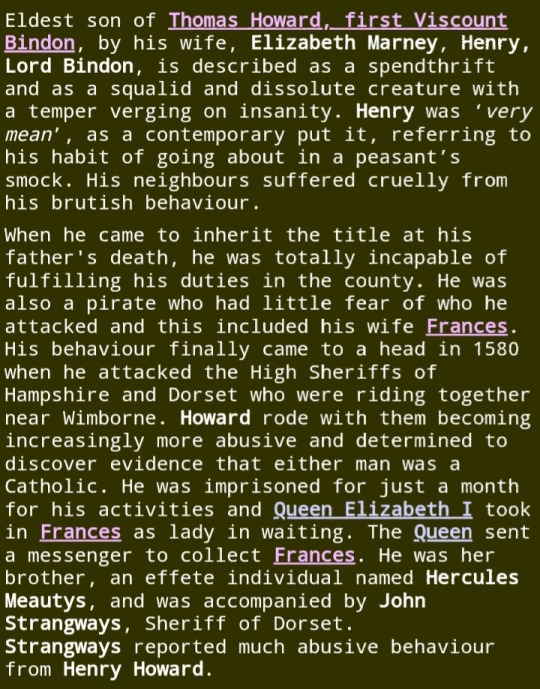
• Being a pirate;
• Dressing as a tramp;
• Beating everyone including his wife.
This gave me the the idea that perhaps his and Norfolk's reputation had somehow been rolled up together over the centuries, where this Henry Howard, although unknown today, was probably infamous in his time, and maybe his behaviour in a sense lended credibility to the accusations of spousal abuse against Norfolk, where people felt Henry 'got it from somewhere'.
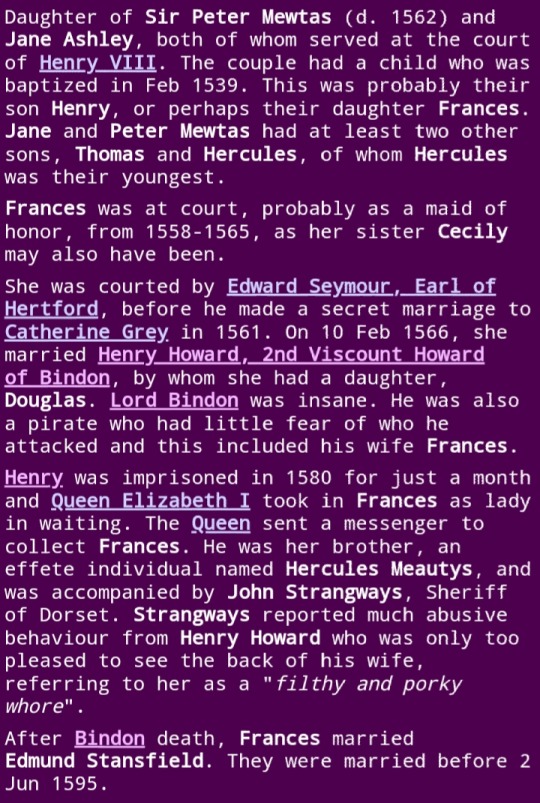
When Elizabeth learnt what he was up to, she sent Hercules Meautys (what a name) to rescue his sister, and took Frances in, with her husband dubbing her 'a filthy and porky whore', which was rich coming from him.
And his other son, the 3rd Viscount, killed his own father-in-law and had a long-running feud with Walter Raleigh.
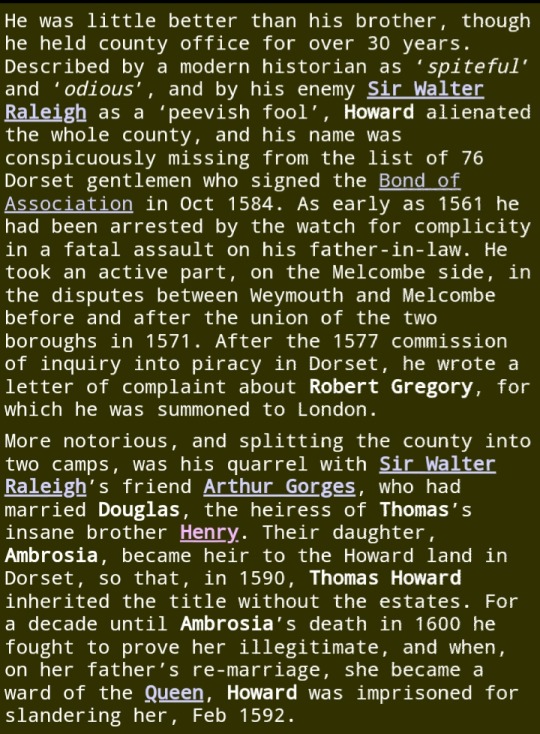
He also spent years trying to have his brother's granddaughter Ambrosia declared a bastard to grab all her land, so Elizabeth locked him up!
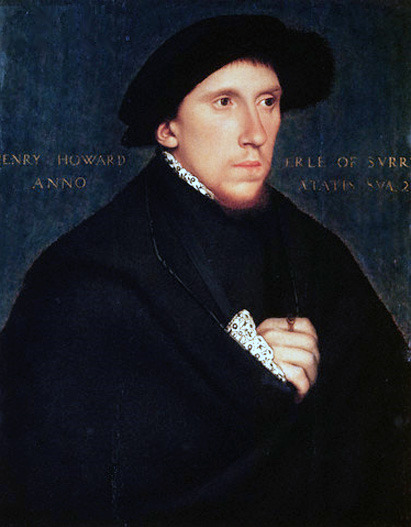
Henry Howard, Earl of Surrey
Anne found Surrey a wife and took him with her to France, where he and FitzRoy remained as honoured guests until the next autumn.
He was then obliged to serve as Earl Marshal as Anne and George were sentenced to death.
Four years later, according to Gareth Russell, Surrey not only watched Cromwell's execution, but gloated about it afterwards:
'Henry Howard, Earl of Surrey, stood at the forefront of the crowd and watched the scene without pity. He was missing his cousin's wedding to be here to see his family's bête noire finished off.
Later that day, he could not conceal his good mood. It felt to him like a settling of scores:
"Now is the false churl dead, so ambitious of others' blood."'
What does this mean?
Who's blood has Cromwell lusted after?
Who did he kill four years ago?
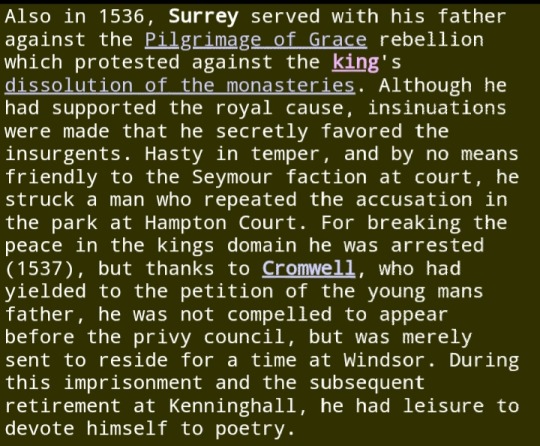
Surrey can't be referring to himself when Cromwell had actually protected him from punishment not long before, which in itself suggests a few interesting things:
• Cromwell was not yet aware of just how much the Howards despised him, as in, up til then his relationship with them was at least civil, cordial even, so the old line about Norfolk begrudging the 'new men' just because they're new men doesn't quite wash.
• This would've the perfect opportunity to bring down a mighty rival, but instead Cromwell felt bizarrely generous and intervened on Surrey's behalf, meaning he saw no harm in preserving the family, and instead thought it useful to get them on side.
• Why does he feel the need to favour the family?
Has he done something to antagonise them?
• The Howards are collectively putting on an Oscar-worthy acting routine of feigned friendliness, or at least indifference to said actions, so Cromwell, whilst he might suspect he's given slight offence, assumes it'll soon be forgotten if he pats them on the head here and there.
• Except whatever Cromwell did, saving Surrey wasn't enough to warrant forgiveness.
And let's examine this quote in detail:
Surrey is at 'the forefront' of spectators, keen to behold Cromwell dying in all its gory brutality, besides opting to watch such a horrendous deed over attending Katherine's wedding.
Instead of a happy celebration of his family's success, something he could've easily enjoyed in the knowledge of Cromwell being dealt with out of the way, he insisted on serving as a witness, as if it wouldn't be over until he'd seen it done, almost to be sure that it had.
For this would 'settle the score', shedding his blood in payback for... what exactly?
Thetford Priory?
Is that all?
Or for the blood Cromwell himself so coveted?
And even the sight of such suffering left Surrey unmoved, ridiculing the dead man not only as a 'churl', but a 'false' one.
False to whom?
'False' as in affecting loyalty to his Queen whilst working to bring her down?
Because is that extreme level of hatred really just supposed to be nothing deeper than empty class prejudice?
Usually, Cromwell's fractious history with the Howards is portrayed as Norfolk's one-man defamation campaign of all-encompassing lordly outrage verging on eye-popping insanity, except Surrey clearly loathed him too.
Perhaps from that we can conclude that Cromwell had become unpopular with the whole family, hence the 'bete noir' reference above.
When Surrey's resentment is remembered, it's conveniently boxed up and filed away as the same-old 'snobbery' of his father, which a very neat, uncomplicated excuse that prevents us looking into it properly.
I daresay Surrey was proud and class-conscious, but wouldn't everyone be like that, to a greater or lesser extent?
Why then is this 'haughtiness' only ever attributed to characters we're supposed to dislike, namely Anne, Norfolk, and occasionally George and Surrey, with the 'good' people somehow immune to such 'base' emotions?
Indeed, I'm starting to wonder how much real evidence there is for this common supposition of arrogance.
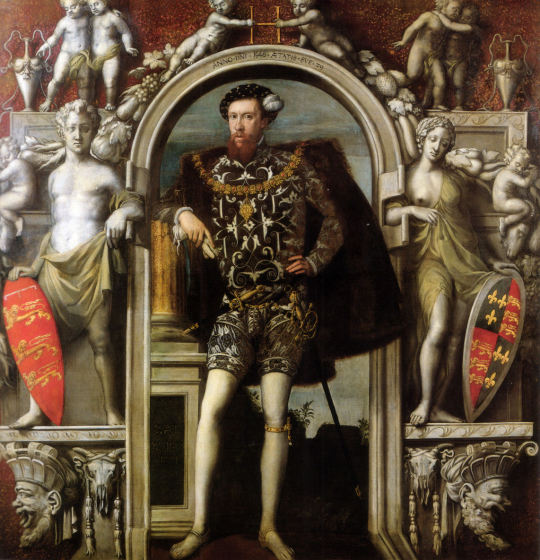
As if Surrey's known at all, it's for the manner of his death, namely he 'got himself killed' by 'stupidly' quartering the royal arms with his own, which, whilst a gross oversimplification, nevertheless defines him, where history views his character through this lens and reads his entire life backwards, as if there's no explanation for his behaviour other than he was just born to be a cocksure moron.
It plays upon modern bigotry against aristocrats, where they're all stuck-up, slow-witted inbreds fixated with the pecking order and archiac symbolism, keeping the honest worker down to prove they're better than everyone else, which is a laugh because they're all REALLY shallow, superfluous chuckleheads and deserve what they get.
Since the idea Surrey died for something so 'silly' as what badge went where slots so well into the stereotype, then it's cheapened his reputation overall.
Rather than being highly esteemed as a pioneer of English literature and the forerunner of Shakespeare, he's treated as nothing but a hot-headed toff tripped up by his own idiotic pretensions, with an end offered as a 'fitting' denouement, almost a lesson in morality; about where not 'knowing your place' or 'getting ideas above your station' leads... after vilifying Surrey and Norfolk for apparently demanding people know their place and not get ideas above their station.
Something hypocritical there.
There's also a reflexive judgementalism within this fandom and the lower end of publishing (i.e. novels and pop. history) where it's assumed if Anne or any of her family are executed, then even if they're technically innocent, they must've deserved it really, else 'the universe' wouldn't let it happen.
Therefore, known evidence is read with the most bad-faith interpretation, with any declared slip leapt upon and blown out of proportion, solely to prove their own bias correct.
You're right to think that, you are.
Hating them makes you A Good Person.
Again, this ONLY applies to Anne and her supporters, not her enemies.
No, no. They were martyrs to the Cause.
But I wouldn't say Surrey's usage of royal arms spoke to any pathological sense of superiority, certainly not to the extent it should define his memory.
Heraldry and ancestry is the lifeblood of nobility: everyone he knew fought for whatever their birth and court careers entitled them, so why shouldn't he?
Look at his sister protesting again and again and again for her rights as FitzRoy's widow: does this make her a 'snob' because she never gave up fighting?
In fact, dubbing Cromwell a 'churl' doesn't mean too much either.
The average person objects to someone because they're a thief, cheat, liar, etc. but calling them as much is a toothless insult, as they'd require a sense of honour to feel the sting.
And if they had that, they would've have committed the offence it in the first place.
So, you pick on something they probably are sensitive about, such as status or physical appearance, to get your own back.
Calling Henry VIII, for example, a fat bastard, doesn't mean you oppose him for having a weight problem, or that you dislike fat men generally.
It's that you're hitting 'below the belt' to inflict the worst punishment you can.
Oh yeah, it's petty, but the aggrieved often are.
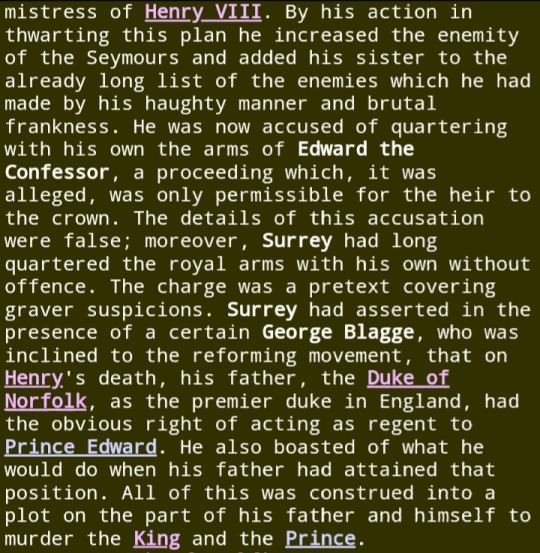
Surrey's real crime, if we deem it one, was apparently rash language of what vengeance he'd wreak on his foes once the King was gone, meaning the Seymours.
So is it mere coincidence that the main targets of this infamous 'snobbery' are those who caused or benefited from Anne's fall?
Are we to believe his only complaint, right down to twice vetoing Mary Howard's marriage, is nothing better than looking down his nose at humble Seymour origins, for they've done nothing whatsoever to draw his ire?
For all the time I've been reading history, the way the court of 1536 splits between the Boleyns and those pushing Jane Seymour, and then, once the Boleyns are wiped out, it greatest rivalry becomes Howard versus Seymour, one lasting for the remainder of Henry's reign, has always struck me as both telling and appropriate.
The idea the Howards took over hating the Seymours because of their slain family is to me to most obvious explanation; the driving force pushing the enmity beyond a decade, and blaming it all on snooty la-di-da attitudes baffles me.
It's so pat and offhand, as if it was thrown into historical research centuries ago and never questioned, passed down to us as unassailable received wisdom, rendered true from repetition, as no one likes Surrey or Norfolk enough to bother reassessing their motivations.
But could such prolonged open hostility run on no greater impulse than keeping the gentry in check?
Is THAT all?
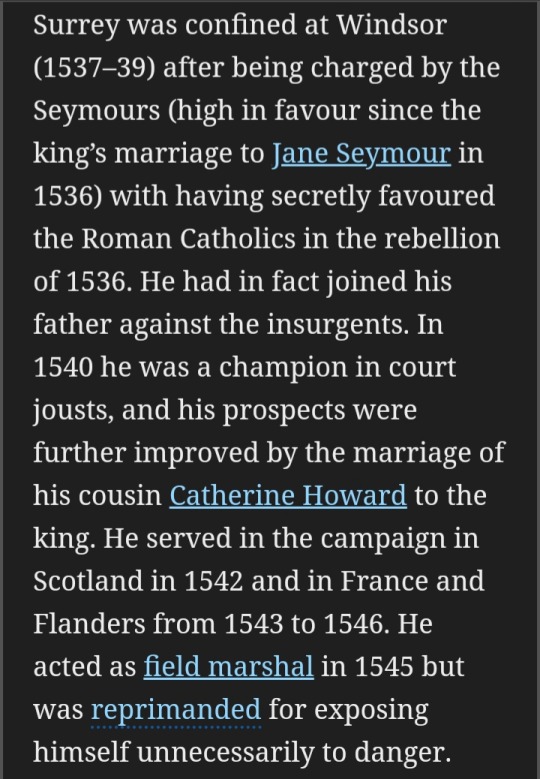
And do note how leading this narrative is, where, if we accept the Howards despised the Seymours as upstarts, then the fault for all bad blood is immediately shoved onto them and them alone, when those poor Seymour lads, rosy-cheeked and pure of heart, are just doing their best in life, working hard and loving everyone.
But oh! Those nasty Howards bullies are So Mean!
Not once is it reversed, proposing that the Seymours envied the Howards' breeding and birth, vowing to bring them down out of spite.
Instead they're absolved of all guilt in the conflict and justified in everything they do as a self-defence measure, even when they brought about Surrey's death and tried it on ten years previously.
So why on earth should he like them?
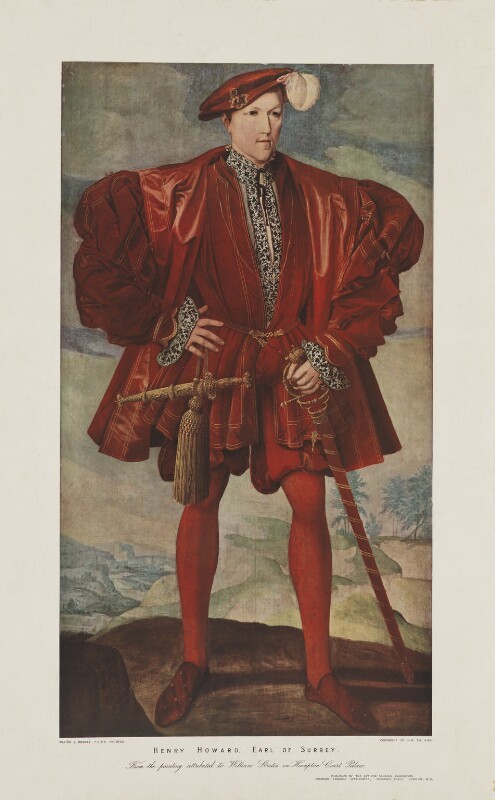
How I wish this painting still existed.
Starkey describes Henry Howard thus:
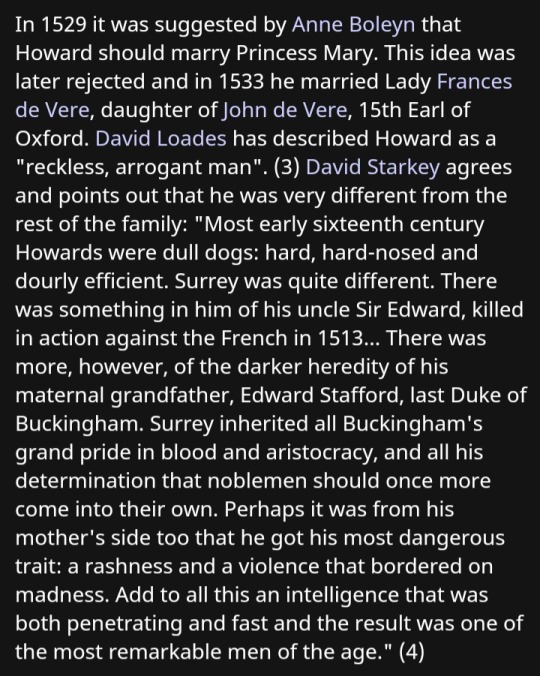
'Surrey inherited all Buckingham's grand pride in blood and aristocracy, and all his determination that noblemen should once more come into their own.
Perhaps it was from his mother's side too that he got his most dangerous trait: a rashness and a violence that bordered on madness.
Add to all this an intelligence that was both penetrating and fast and the result was one of the most remarkable men of the age.'
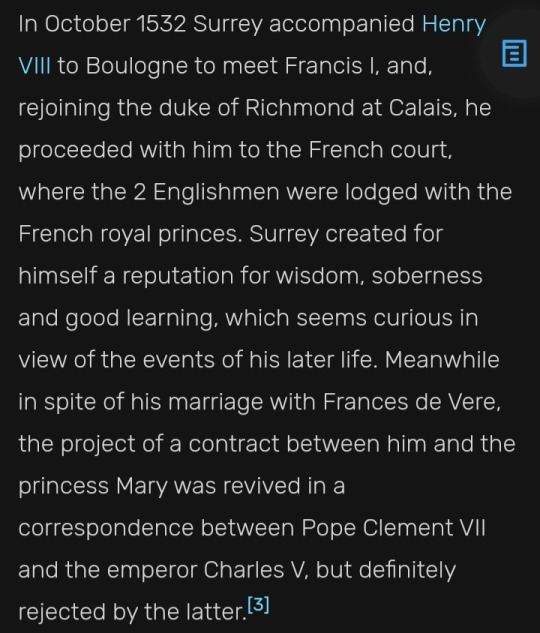
And yet I don't know of any aggressive outbursts prior to 1536, being then known for 'soberness and good learning'.
We tend to class poets of later eras as on the sensitive side, so far from being 'always like that', it may well be that the deaths of George, Anne, FitzRoy and putting down the Pilgrimage of Grace knocked him off the rails, a process then driven beyond all remedy by watching Katherine die and the suicidal shame he endured over his military failures.

Although I do like the sound of him as the hero of High Fantasy.
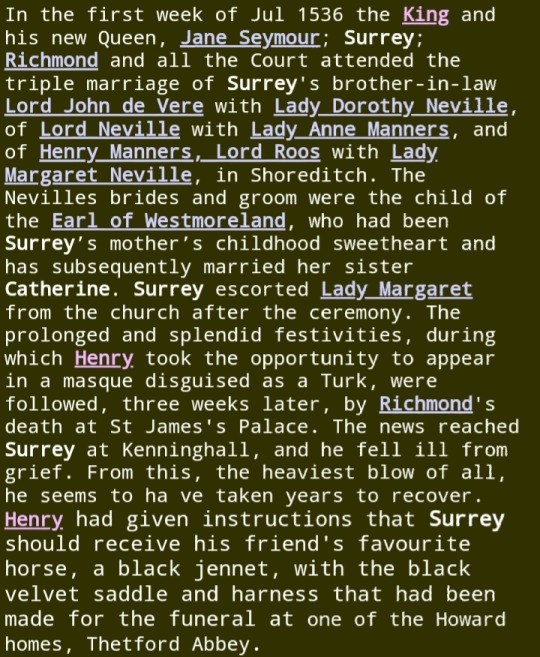
Whilst I'm here, let's look at this very awkward scenario of Surrey attending the triple Neville wedding, being the children of his mother's intended and her sister.
Considering how desperate so many are to clear Henry VIII of Anne's death, protesting how he Genuinely Believed and that makes it alright then, he's cheerful enough fannying about as a Turk less than two months later.
Finally, writing this I read several of Surrey's poems, and must include this truly endearing piece commemorating his wife's love for him:
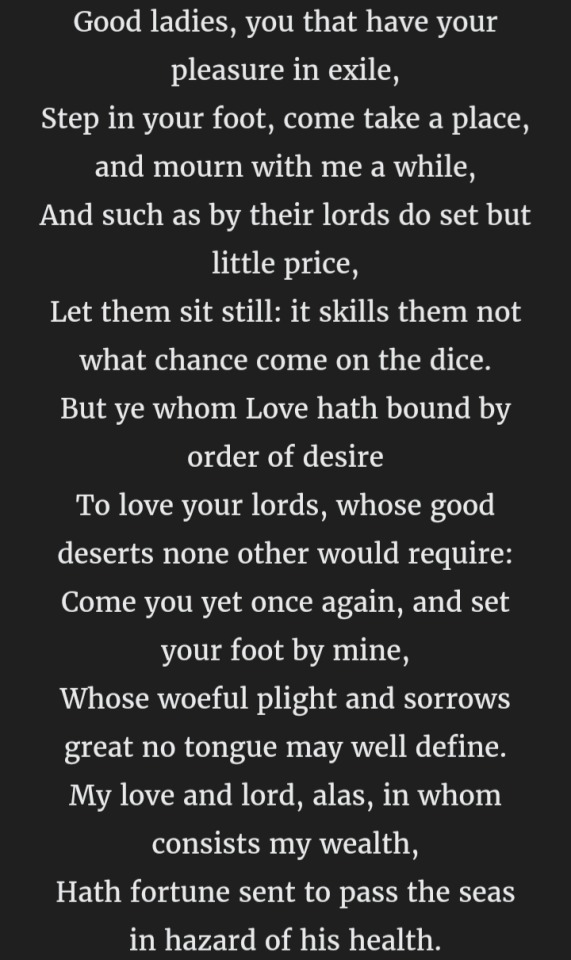
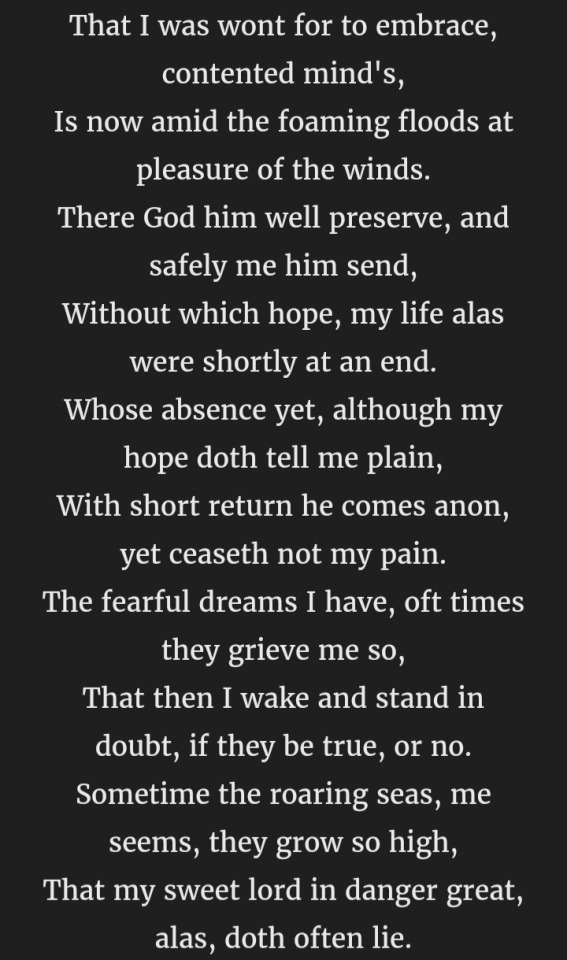
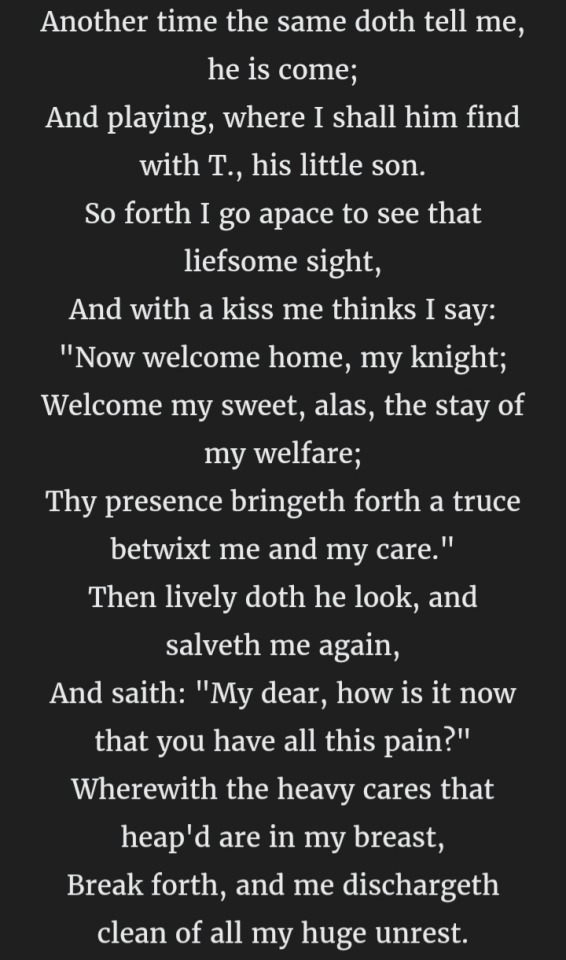
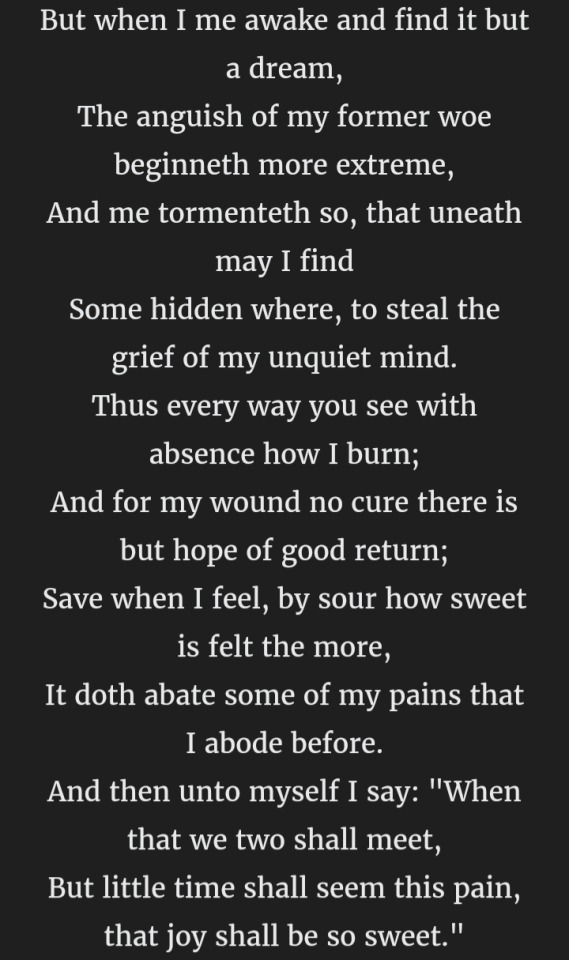
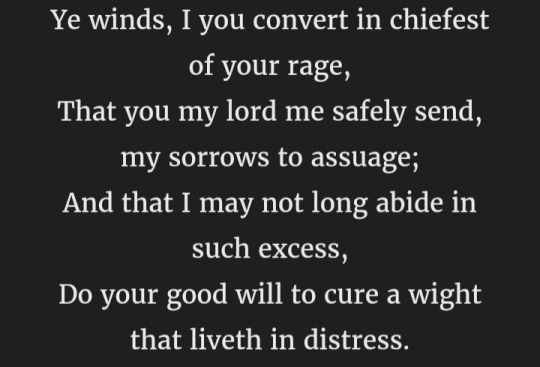
Such a poet, and still no one credits him with any tender emotions.
Anyway, don't mind me but I've hit the picture limit.
I'm not sure when Part Two will be done, but I'll let you know, come the time.
#Henry Howard#Catherine Howard Countess of Bridgewater#William Howard#Thomas Howard 1st Viscount Howard of Bindon#Anne Boleyn#Elizabeth I#Henry Howard 2nd Viscount Howard of Bindon#Thomas Howard 3rd Viscount Howard of Bindon#Frances Meautys#Rhys ap Gruffyd#Thomas Cromwell#Young and Damned and Fair#Gareth Russell#The Life and Death of Anne Boleyn#Eric Ives#David Starkey#Quotes
6 notes
·
View notes
Text
Firebrand Part II: Was Jude Law's Henry VIII Accurate?

TW: DV, mention of executions
I recently got in trouble on a Facebook group for my thoughts on this, which was an interesting affair to say the least. But a lot of Tudor Enthusiasts are fighting right now about Jude Law's portrayal of Henry VIII. So, as an historian, what do I think on the matter?
Apparently my take was too hot for the group I put it on lmao
In Firebrand, Jude Law's Henry VIII is violent, narcissistic, and quick to harm. In one of the first scenes with his character, Kit questions him about the implications of the execution of her on-screen friend, Anne Askew, and Henry doesn't hesitate to grab her hair, force her to kneel, and snarl at her. Later in the film, a drunk Henry beats a pregnant Kit, having begun to think that her child isn't his. This version is much colder than JRM's portrayal, and much, much nastier than Keith Michell's. But, was it accurate?
Henry VIII did have a history of pretty crap behavior: this was the person who executed the Duke of Buckingham on flimsy evidence that they were planning a coup. He was also well known for beating his advisors, specifically Thomas Cromwell. Although he began as an affable prince who was kind to women and those in need, it didn't last long: he left Catherine of Aragon to die at Kimbolton when she had heart cancer, and refused to let her daughter see her before her death.
Henry is also well known as the king who executed two of his wives: Anne Boleyn in 1536 and Katherine Howard in 1542. Anne, his second wife whom he created the Anglican church for, had failed to give him a son by 1536, and had behaved inappropriately as Queen of England: conversations about the King's death had circulated, as well as bullying behaviors. Mind you, Anne was a knight's daughter: she had not been trained for this role in her youth, nor did she receive that training after her ascent to the throne. Henry used false charges, some of which surrounded her inappropriateness, to have her arrested and executed. Anne is widely believed to be innocent: a sentiment that I, too believe.
Katherine Howard was Henry's fifth wife. Historians hope that she was closer to 17 at the time of her marriage to him, but there's a chance she was closer to 15. Katherine's main offence was a tricky one: she retroactively violated a law that did not exist at the time of her marriage to Henry: that any woman who married the king must disclose her sexual history within 30 days of the marriage. Katherine had a history, thanks to her upbringing at her grandmother's estate.
The Dowager Duchess Agnes Howard owned Chesworth House in Horsham, where she took in aristocratic children who were down on their luck. Katherine was a member of the infamous Howard clan, thus securing her place in the house. Although Chesworth sounds like a lovely place on paper, it housed an open secret: there was neglect within the walls, and the girls' dormitory had no lock on it. It is alleged that Katherine Howard had two very inappropriate relationships during her tenure there: both with older men, and both while she was a pre-teenager. Today, we call what happened to her grooming, however that was not the case back in the 16th century: it was fornication, and retroactively a crime.
Katherine also had a friendship with one Thomas Culpeper: Culpeper had a history of sexual violence, and it seems he became much too close to the naive, young Queen. Their letters were used as evidence that they both committed adultery with one another: once against a statement that is being seen through different lenses in the history community today. Henry swore once he heard the news of her infidelity that he would strangle her himself, and often wept.
Both would lose their lives over this malarky.
On another note: what we call domestic violence in the 21st century was once legal, and it was so in the Tudor era. Within marriage vows, a woman promised to be "bonny and buxom in bed and in board," and if she failed, she could be expected to be beaten. Men were the head of the household: a woman was beneath him, and so were the children, and he was expected to discipline both. This often came in the form of hitting, boxing, or using a switch to get the job done. However, there were rules pertaining to how a husband could beat his wife: if the rod he used to beat her was too thick (thicker than his thumb), he could get in massive trouble with the church. If a man used violence too often in the household, or his discipline was life threatening, a woman could annul her marriage on the grounds of cruelty.
Henry, by the time he was married, was expected to discipline his wives: he was their leader and their head, and they were to obey. It was nearly expected that he would discipline them.
So, was Jude Law accurate to Henry VIII? Very much so. I think he captured the essence of the real man perfectly. Law really got into this role, even securing a perfume that smelled like stool to be more accurate to his character. I think it's high time that we stop fantasizing about Henry VIII as a cordial and romantic husband and recognize him for who he was: cruel, cold, and tyrannical.
2 notes
·
View notes
Text
The Wives of King Henry the VIII.
His marriage were marked by varying degrees of happiness and tragedy, with several of his wives being executed for treason or adultery.
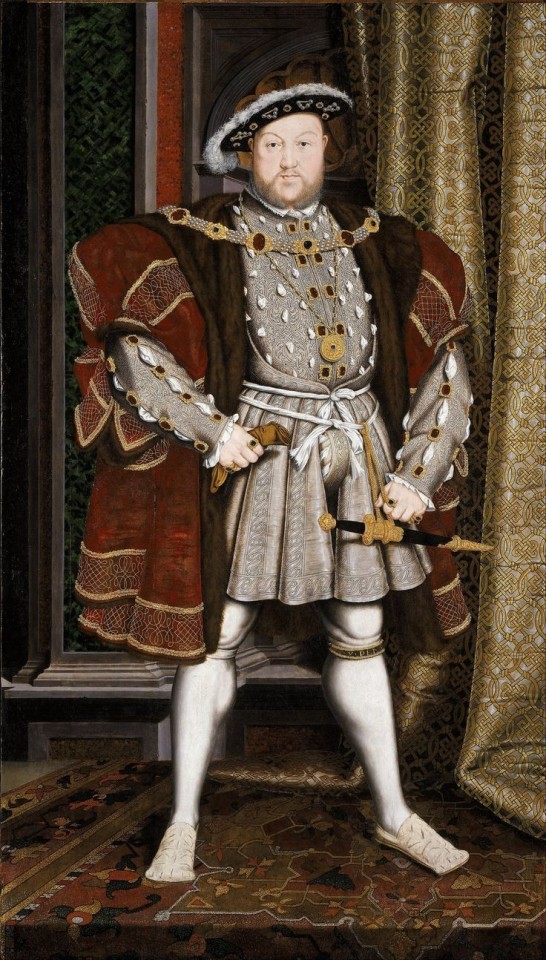
Henry Tudor VIII
Henry the VIII
Henry VIII was the King of England from 1509 until his death in 1547. He is perhaps best known for his six marriages, as well as his role in the English Reformation.
Henry VIII was born on June 28, 1491, in Greenwich, England, the second son of King Henry VII and Elizabeth of York. He became heir to the throne after the death of his older brother Arthur in 1502.
Henry VIII married his first wife, Catherine of Aragon, in 1509. However, after many years of marriage and several miscarriages, Henry became convinced that his marriage was cursed, and he sought an annulment from the pope. When the pope refused to grant the annulment, Henry broke with the Catholic Church and declared himself the head of the Church of England, which allowed him to annul his marriage and marry his second wife, Anne Boleyn.
Henry's subsequent marriages to Jane Seymour, Anne of Cleves, Catherine Howard, and Catherine Parr were marked by varying degrees of happiness and tragedy, with several of his wives being executed for treason or adultery.
In addition to his personal life, Henry VIII is also remembered for his political and religious actions. He oversaw the dissolution of the monasteries in England, which led to the redistribution of their wealth and property, and he established the Church of England as a separate entity from the Catholic Church.
King Henry VIII of England had a total of six wives:
Catherine of Aragon (1485-1536): Devorced for Bearing No Son

Catherine of Aragon
Catherine of Aragon: Henry's first wife, married in 1509. She was the widow of Henry's older brother, Arthur. Catherine and Henry were married for 24 years but were unable to produce a male heir, which led to their divorce in 1533.
Anne Boleyn (c. 1501-1536): The Union That Sparked Reformation, Beheaded
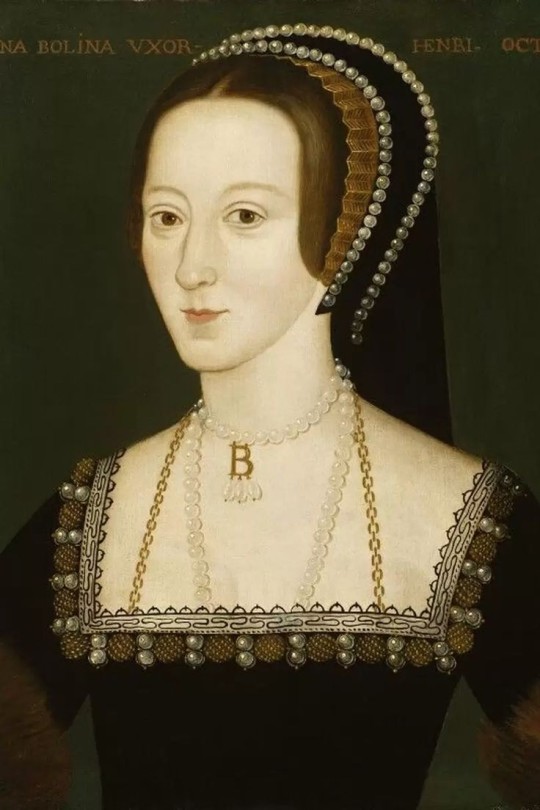
Anne Boleyn
Anne Boleyn: Henry's second wife, married in 1533. Anne was a maid of honor in Catherine's court and became Henry's mistress while he was still married to Catherine. Anne was unable to produce a male heir and was accused of adultery, incest, and treason. She was beheaded in 1536.
Jane Seymour (1508-1537): The only one the King truly loved
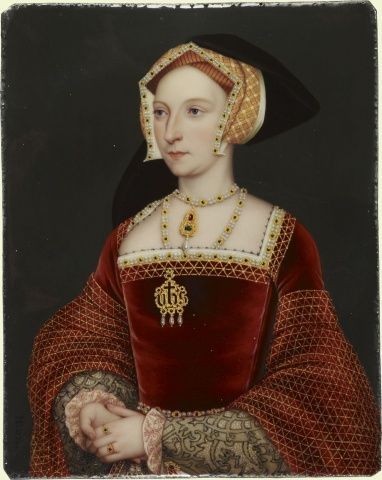
Jane Seymour
Jane Seymour: Henry's third wife, married in 1536, shortly after Anne Boleyn's execution. Jane was able to give Henry the male heir he had long desired, Edward VI, but she died from complications following childbirth.
Anne of Cleves (1515-1557): Strategic, Six-Month Marriage.
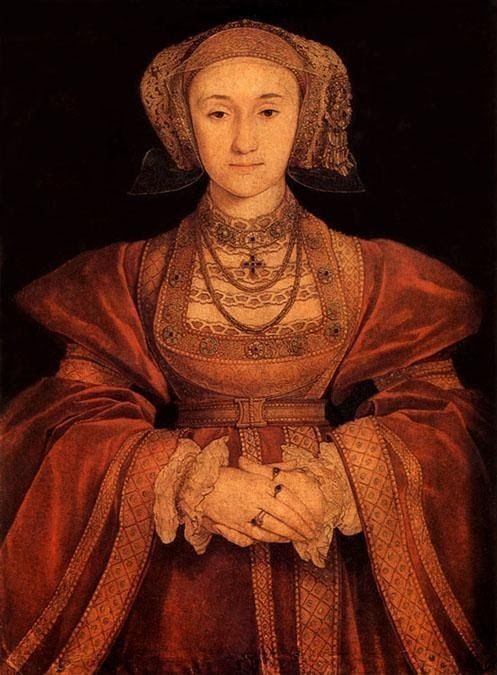
Anne of Cleves
Anne of Cleves: Henry's fourth wife, married in 1540. The marriage was arranged by Thomas Cromwell, but Henry found Anne unattractive and the marriage was annulled after just six months.
Catherine Howard (1523-1542): Valued, Then Executed

Catherine Howard
Catherine Howard: Henry's fifth wife, married in 1540. Catherine was accused of adultery and executed in 1542, just two years after her marriage to Henry.
Katherine Parr (1512-1548): The Queen Who Outlived Henry
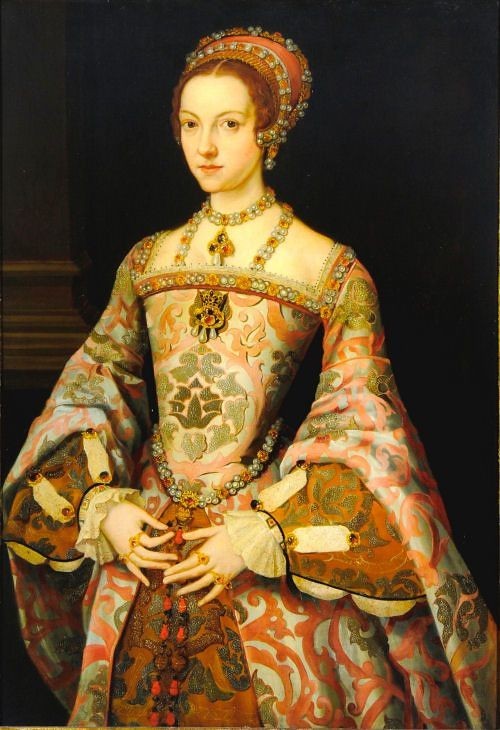
Katherine Parr
Catherine Parr: Henry's sixth and final wife, married in 1543. Catherine was a widow and a well-educated woman who acted as a mother figure to Henry's children. She outlived Henry and later remarried.
In conclusion, the king's desperate quest for political unification and a healthy male heir drove him to annul two marriages and have two wives beheaded. His chaotic love life caused an unstable succession, foreign policy implications and even led to the break with the Church of Rome.
2 notes
·
View notes
Text
officerwaltons:
THE YOUNG PRINCE- no, bastard, he corrects himself- needs someone to be furious with. His mother is a saint and imprisoned in some faraway manor. Henry cannot be angry with his father, the king, for that would surely be treason. He also believes it’s possible, perhaps even likely, that his father has been bewitched by the Boleyn woman. In which case, Henry surely can lay no blame at the king’s feet. Similarly, no blame can be placed on the Cardinal. He is God’s representative on earth. There is no way to be angry with him and preserve his soul. For the pious Henry Tudor, that is a serious obstacle.
And so leaves, unfortunately for him, Thomas Cromwell. Even so, Henry regrets the words as soon as they’re out of his mouth. No matter who’s fault it is, it certainly isn’t the lowly Cromwell’s. “Of course,” Henry is quick to agree that his father’s orders must be followed. He is aware his sole existence is a threat to the Boleyn faction. So, he keeps his head low as much as he is able. “His Majesty has only the best intentions. I hope only that he is advised by worthy men, sir.”
It is not for a man such as himself to guess at the will of kings, but it does seem to him that Henry shall let Anne go. Nor that she will relent. England and Christendom itself is at the mercy of the stubbornness of two women and which might bend first. Catherine is too proud to step aside, though Thomas can only see things getting worse for her and her children. She is a mother separated from those she gave birth to; what greater suffering could there be on earth? But still she does not relent. The disgraced son has his parent's pride, to so lash out a party not responsible for this calamity. But Thomas shall bear it if he must; what other choice does he have?
Perhaps the youth now holds his tongue because words are a double-edged sword at court, though for Thomas to let them slip to another party would have little effect; the animosity is well-known. But that is easier to believe than that the other feels any guilt to speaking to a man as lowly as he. "I hope the same, my lord," he replies with a light nod of his head. But Thomas knows of the stirring behind the theatre's curtains; Henry is growing impatient with the lack of progress and Thomas knows that Wolsey's enemies would love the opportunity to stick a knife in his back. "And who more worthy than the cardinal? Who desires peace at court and to resolve this... familial misunderstanding." It is no misunderstanding; but he must choose his words carefully. "As I imagine you desire as well?" He asks, but he means to prod: was there any budging the young man from his complete opposition?
0 notes
Text

WOLF HALL by Hilary Mantel
RELEASE DATE: Oct. 13, 2009
Exhaustive examination of the circumstances surrounding Henry VIII’s schism-inducing marriage to Anne Boleyn.
Versatile British novelist Mantel (Giving Up the Ghost, 2006, etc.) forays into the saturated field of Tudor historicals to cover eight years (1527–35) of Henry’s long, tumultuous reign. They’re chronicled from the point of view of consummate courtier Thomas Cromwell, whose commentary on the doings of his irascible and inwardly tormented king is impressionistic, idiosyncratic and self-interested. The son of a cruel blacksmith, Cromwell fled his father’s beatings to become a soldier of fortune in France and Italy, later a cloth trader and banker. He begins his political career as secretary to Cardinal Wolsey, Lord Chancellor of England. Having failed to secure the Pope’s permission for Henry to divorce Queen Katherine, Wolsey falls out of favor with the monarch and is supplanted by Sir Thomas More, portrayed here as a domestic tyrant and enthusiastic torturer of Protestants. Unemployed, Cromwell is soon advising Henry himself and acting as confidante to Anne Boleyn and her sister Mary, former mistress of both Henry and King Francis I of France. When plague takes his wife and children, Cromwell creates a new family by taking in his late siblings’ children and mentoring impoverished young men who remind him of his low-born, youthful self. The religious issues of the day swirl around the events at court, including the rise of Luther and the burgeoning movement to translate the Bible into vernacular languages. Anne is cast in an unsympathetic light as a petulant, calculating temptress who withholds her favors until Henry is willing to make her queen. Although Mantel’s language is original, evocative and at times wittily anachronistic, this minute exegesis of a relatively brief, albeit momentous, period in English history occasionally grows tedious. The characters, including Cromwell, remain unknowable, their emotions closely guarded; this works well for court intrigues, less so for fiction.
Masterfully written and researched but likely to appeal mainly to devotees of all things Tudor.
0 notes
Text
@mihrsuri
Thinking of an alternate ot3!Mary where she's still dismayed by her siblings' paternity, but for different reasons.
(Below the cut for period-typical attitudes towards bastardy and non-heterosexual relationships, as well as references to past child abuse.)
Soon after the Prince of Wales was born, Mary had begun to notice some subtleties. She had noticed the looks that passed between her father and his chief counselor, the way they automatically bent their heads together, how Anne’s eyes turned soft for both her husband and for the Lord Chancellor.
The blood of the Inquisition runs strong in Mary’s veins, but her soul has withstood the Pope’s rejection, and her mind has been exposed to the Reformation’s most cogent arguments, and her heart was rejuvenated only through Anne’s intercession. Silently she had seen the silent love that bound all three together, and silently she had come to terms with it.
Soon after the Duke of York is born, Mary notices some more subtleties, and this time all her silence morphs into cold fear.
Fear that someone, somewhere will make the connection between George's dark curls and the Duke of Essex, and civil war will rip England apart. Fear that Elizabeth and Tommy will be branded bastards as well. Fear that should her father’s ardor for Anne ever cool, he will have the perfect excuse to send her to the Tower. Fear that if people believe that King Henry’s younger children are bastards, they may well believe Mary herself is a bastard, Katherine of Aragon’s reputation for virtue notwithstanding.
(And maybe there is a bit of anger as well. Anger, that Anne had chosen to put her children -- Mary’s siblings -- at risk. Anger, that Thomas Cromwell, so famed for his quiet diligent intelligence, should commit such treason. Anger, petulant though it is, that Anne witnessed how Mary suffered at her father’s hands, and she still blithely decided to let Cromwell sire her child, as though she did not know how mercurial the King of England could be, as though all the pain Mary had been through was for nothing.)
“Love happens where it might,” she says when she confronts Anne and Cromwell, “even when it must be kept secret, but to write it out in the face of an innocent child?”
Mary’s face feels hot, and she knows she must look flushed.
“I had noticed, ever since Tommy was born, what the three of you share, and I thought nothing of it, that if it brought you all some quiet happiness, there was nothing wrong in it. But I never dreamed you would be so foolish as to do this.”
Anne lifts her chin. Her voice is soothing when she speaks, as though trying to coax Mary. “We are married in the sight of God, and all our children are legitimate. I had thought you --”
“My understanding is immaterial, Your Majesty, or do you not know that?” Mary snaps, frustration driving her to interrupt her queen. “The world we live in is the world we live in.”
“I know more of the world than Your Highness might suspect, having risen from the breweries of Putney to the Lord Chancellor.” Cromwell’s voice is measured and decidedly respectful, but the iciness is palpable, and Anne lays a hand on his wrist.
“It was the King who raised you there, and the King who can drag you down,” Mary presses. “Did either of you ever stop to think that if my father should grow angry with you, on some pretext or another, you have handed him the grounds for treason? Did you ever stop to consider the consequences?”
Tears break into her eyes as she tries to find the words that capture the magnitude of their betrayal. “I can hardly believe that you bear so little love for George. And you, my lord of Essex, if you consider yourself a father to Elizabeth and Tommy, as you claim, did you never stop to think that this could taint them as well?”
Her throat is briefly too tight to permit speaking.
“You might know what it is to be common, but I know what it is to be a bastard. Even at your lowest standing, you have always been able to claim legitimacy, and I can tell you that there is a stigma to bastardy like nothing else. The things that people assume of you…”
Haltingly, she tells them of the music master who had enticed her with sweets and promises and pretty words. She had been ten or eleven, after the papal legate declared her parents’ marriage invalid but made in good faith, leaving Mary in limbo. She was a princess but in name only, her father having banished her mother from court in fear of how she would influence Mary, and her status was uncertain. The music master had tried to tempt her, and he had ripped her gown and she had screamed, and he had laughed and told her that she was only a bastard girl, that she had desired his attentions and that no one would believe her or care. She managed to escape, and soon after he was dismissed for another reason, but even after she was restored, she never spoke of it to anyone.
“Perhaps I should have spoken of it, bared my shame for all to see, and then you might have reconsidered what you planned.” Anne and Cromwell are ashen-faced, when she is finished, and some small part of Mary is gratified to know that they are horrified, that what she went through was as wrong as she always thought it was. The greater part of her is incensed, however, that they are so ignorant that she had to spell out all the implications of their actions to them.
“I was truly my father’s child, the daughter of a Princess of Spain, with the Pope speaking in my favor, and still that was my lot in life for years. George will be the bastard-born child of two commoners, and all your power derives from the King.”
Tears threaten again, and this time they fall, carving hot paths down her cheeks. “Did you ever consider, Your Grace, that my place depends upon yours?” She focuses her attention on Anne. “It was only by your intervention that I was restored, and if your star should fall, my star will fall with yours?”
She pauses to catch her breath. “I would lose my best ally at court, and if my father should someday turn against me, there will be no one to speak for me.”
Mary closes her eyes. “Did I mean so little to you?”
She whispers it so softly that Mary almost cannot hear her own words.
Silence reigns supreme, and when Mary opens her eyes again, Anne and Thomas are engaged in a quiet conversation, debating what next to say. Really, though, what more is there to say? George has been born, and all the references to his Welsh ancestry will not change the spring of his curls or the shape of his brow. She will have to bear this secret for the rest of his life, and pray that it never comes to light.
All of Mary’s fear and anger drains away, in the face of the incontrovertible truth. What use do rage and terror have? She is only disappointed, she finds. She had known she could never trust her father again, but she did not think that Anne would prove to be so fallible as well, ignoring reality for the sake of her whims. Mary can understand the pain of forbidden love, and perhaps one day, there will be no need for people like Anne or the Duke of Essex to hide. That day will not come for another thousand years, however, and they should have been intelligent enough to recognize that. What is the weight of love against the threat of civil war, against the shadow of the Tower and the steel of the headsman's axe and the caprices of a King? Mary can make no excuse for dedicating an innocent child’s life to such danger, and she does not think she will ever look at her second mother the same way again.
She rises, cutting off Anne and Thomas’s discussion. “I have nothing more to say to you, Your Graces. You know full well what the repercussions might be, and I know full well how little power I have over your next actions.”
Mary may be the eldest Princess of England, but there is nothing she can do to combat the foolishness of a Queen and the most favored Duke in England.
I have spent my life learning how little power I have.
“All I can do is love George as my brother, as I do Elizabeth and Tommy. And if it should ever prove necessary, I will do everything in my power to protect them.”
“Thank you, Mary,” Anne says faintly from somewhere behind her. “Truly, I thank you. I had not realized just how much -- but thank you. It gladdens me more than I can say to know you are on their side.”
Mary turns back around. “I do not do it for your sake,” she says, and hurt spasms across her second mother’s face. Mary softens her voice, for she has no desire to hurt her, even if she has lost faith in her. “I do it because they are innocent children.” Children as I was, blameless but blamed, faultless but punished. “Innocent children who could one day be in great danger thanks to your actions. And should it come down to a choice between you and them, I will not hesitate to make it.”
Also on AO3 here.
#ot3: political power trio#tumblrfic#myfics#mary i of england#anne boleyn#thomas cromwell#the tudors#history#i feel like this is a more sympathetic version of mary#because it excises the worst of the motivations behind her disgust#she's accepting of their love but fearful of the consequences that having 'bastard' children could cause#she herself accepts them as legitimate but most of the world never will#and this is a mary who's very aware of the realities of the world#having had her eyes opened at a young age thanks to the catholic church's rejection#she's not as black and white as in OTL and more practical about surviving#similar to elizabeth i in history#ironically while this mary's motives are more understandable i also don't think this mary ever really forgives cromwell#or anne for that matter#her religious prejudices she could eventually overcome#but nothing can ever erase the reality of the world's general homophobia#or her father's changeable favor#and as long as she is aware of the danger#she can never forgive thomas or anne for putting the children in such danger#especially when mary herself has been in such danger
9 notes
·
View notes
Text
History Bites Special: The Six Queens
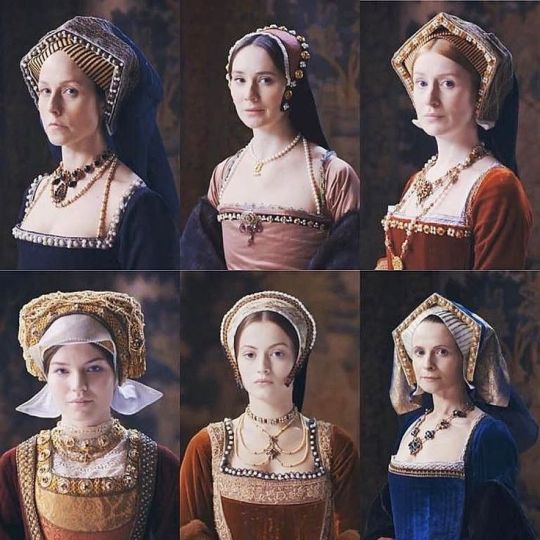
This is the first in a long line of posts where I pick the best moments of history and the antics historical figures in order to give you inspiration for your WIP. Think of History Bites like prompts, only juicer and 90% accurate (results may vary) as I regale you with interesting tidbits about
On this day, Henry VIII died. Unlike last year, I won't be remembering Henry. We will be remembering the Queens and their achievements.
Katherine of Aragon was the daughter of Isabella of Castile, a power Queen Regnant. She lived to see the fall of the Moorish Empire in Spain and the treasures of the East Indies brought back by Christopher Columbus.
Katherine was almost wrecked at sea in her first journey to England. They fleet turned back and the second journey got her safely to England. The first thing she did was attend mass. During her journey, the King, Henry VII decided to go visit her early actually bursting into her chambers to see her.
After her first husband died, Katherine was proposed as a wife to his brother Henry. Her father refused to pay out her dowry, so the wedding was put off for years and years leaving Katherine in poverty as the King of Aragon and King of England basically had a pissing contest. Katherine sold off jewels in order to eat.
When Henry VIII went off to fight in France (another male ego pissing contest that achieved nothing), Katherine handed Scotland its biggest defeat in history. She led troops at Flodden, winning a battle where the Scottish King died. When she wrote to Henry as well as sending him the Scottish king's coat and banners, she mentioned that she had wanted to send the body of the king but the nobles were being pussies and said no. It may have been the shadiest letter of all the Tudor period.
Henry was actually terrified of what Katherine could do. When yelling at one of his advisers, he admitted that Katherine had a chance of beating him in battle. Katherine never did don armour and trample Henry in battle. A shame.
Anne Boleyn was two. Anne was raised abroad in the courts of France and the Netherlands. In the Netherlands, she served the shrewd Margaret of Austria who was fond of her. When Anne returned to English court, she was considered a catch because she was so clever and worldly.
Anne did catch the eye of another man, Henry Percy the son of the Duke of Northumberland. The two were deeply in love and it was rumoured that Percy was going to put aside his father's choice and marry Anne. Cardinal Wolsey broke it up and Anne was banished.
Anne was rather a deft hand at creating catchy and shady mottos. Her first was "Ainsi sera, groigne qui groigne,” which means “Grumble all you like, this is how it’s going to be".
Anne was quite sharp at times. She had her aunt, sister and the King's best friend banished from court. She wore yellow after hearing that Katherine of Aragon was dead, in a mockery of the Spanish mourning tradition. She ordered that the Princess Mary be stripped of her title and serve her own daughter as a maid.
Anne as quite determined. She held Henry off for seven years before agreeing to sleep with him, she stood up to him and the powerful men of the kingdom whenever they went against her and she saw the foundations of the Church of England being laid down due to her influence.
Anne also had a dog named Purkoy, who she adored. When the dog died, Henry had to tell her himself and she was distraught.
Jane Seymour was next. Jane is really debased as being pliant and rather dull when compared to Anne but Jane could be just just as bitchy. On the day Anne walked the scaffold to her death, Jane picked out her wedding clothes.
Jane reconciled Princess Mary and Henry. She acted as a catalyst in bringing them together. Henry yelled at her but in the end she had her way.
Jane begged for mercy for the rebels in the Pilgrimage of Grace. It was rather a ballsy move but she stuck to her guns until Henry reminded her of Anne's execution.
Anne of Cleves was four. Anne grew up in the Duchy of Cleves, her brother being the Duke and a member of the Protestant League. Anne was Henry's last choice of bride as he wanted a French Princess but they told him fuck off so his advisor Cromwell sent Hans Holbein, the court painter to paint the infamous portrait. Henry saw the picture and decided to marry her.
Like his father, Henry couldn't wait to see the bride. Dressing in disguise, Henry went to see Anne. He pressed a kiss on her and she recoiled. She hadn't a clue who he was. Henry left rather wounded, yelling that she looked like a horse and smelled bad.
Anne was oblivious that Henry was working against their marriage from day one. When speaking to her ladies, it became clear that nothing went down in the bedchamber. When she was sent away for her health, she was utterly flummoxed by a letter stating that their marriage was at an end. Anne wept but then picked herself up and took Henry to the cleaners. She got estate after estate from him and became the richest woman in England.
She survived all the Queens and Henry, living to see Mary I's ascension even riding in the coronation procession. She was particularly fond of Princess Elizabeth, even teaching her how to make pancakes so Elizabeth could care for herself.
Catherine Howard was five. She was just a child when Henry decided to chase her. He was not the first old sack of shit to molest (yes, it was. He and M*nnox were fucking wrong. Don't gimme that shit about the times.) Catherine was maid in waiting to Anne of Cleves when she was noticed by Henry. See a pattern here? And Catherine was Anne Boleyn's cousin to boot.
Catherine is usually portrayed as a flighty woman but in reality, Catherine could be quite kind. When hearing that old Countess Pole was in a draughty cell in the Tower, Catherine paid for clothes to be made for her to keep her warm.
When Catherine was in the Tower, she asked for the block to be brought to her so she could practice her execution. Before the axe fell, Catherine was rumoured to cry out, "I die a queen but I would rather die the wife if Culpepper," who was her alleged lover. It is probably myth but one can't help but wish she said it as a last fuck you to Henry.
Kathryn Parr was the last and certainly not least. She had been wed twice before Henry, her last husband dying only a few months before Henry began making eyes at her. Kathryn wanted to marry Thomas Seymour but out of duty married the King.
Kathryn ruled as Regent when Henry went off to France for ego reasons. She brought all the royal children together, mothering Elizabeth and Edward and acting as ally to Mary. She managed to convince Henry to reinstate the Princesses to the succession making them princesses again.
Kathryn was a reformer and scholar. She penned the first novel published by a woman in England. She studied theology, listening to sermons by the controversial preacher Anne Askew. Henry didn't like Kathryn questioning his opinions and drew up a warrant for her arrest. The warrant somehow found its way to Kathryn and she immediately went to Henry and began to repent all her "offenses" (her having an opinion). Henry forgave her. Kathryn was the only queen to survive Henry's displeasure and cling on to her position.
#History Bites#History Bites Special#the six queens#Katherine of Aragon#anne boleyn#Jane Seymour#anne of cleves#Catherine Howard#Kathryn Parr#henry viii#the Tudor era#writing advice#writing reference#writing resources#writing prompts#History bites prompts#writing advice writing resources#writing reference writing resources#writing resources writing reference#fantasy royalty#fantasy guide#history dump
2K notes
·
View notes
Photo
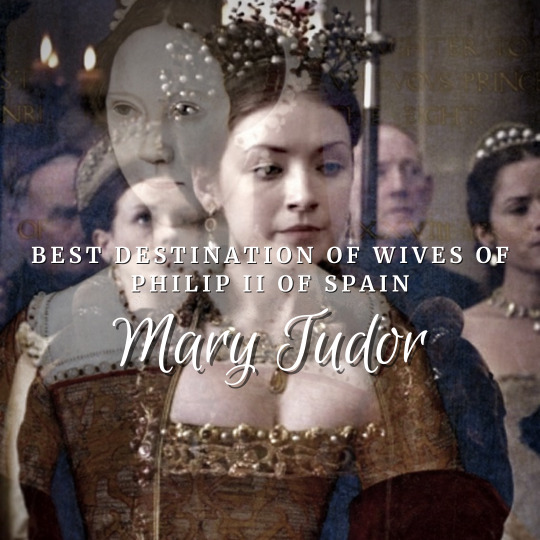
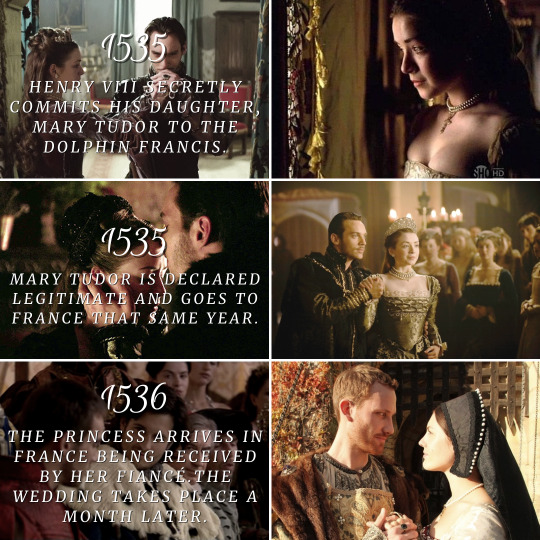
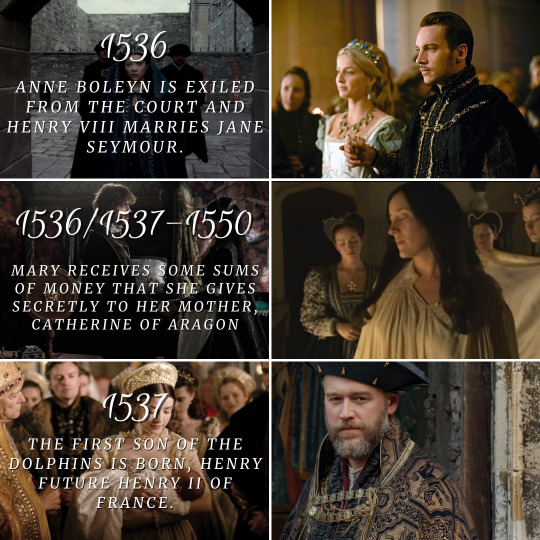
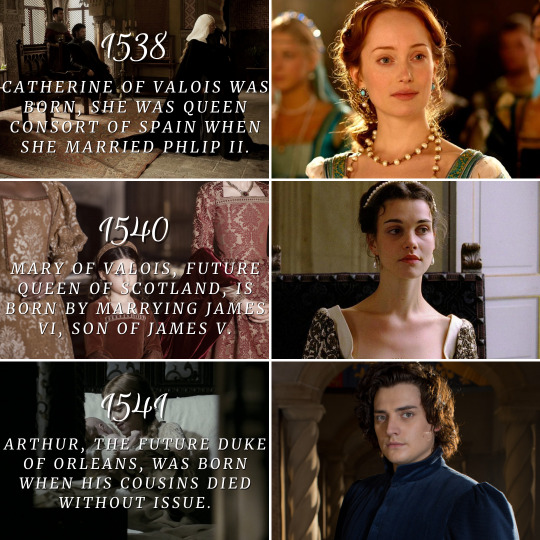

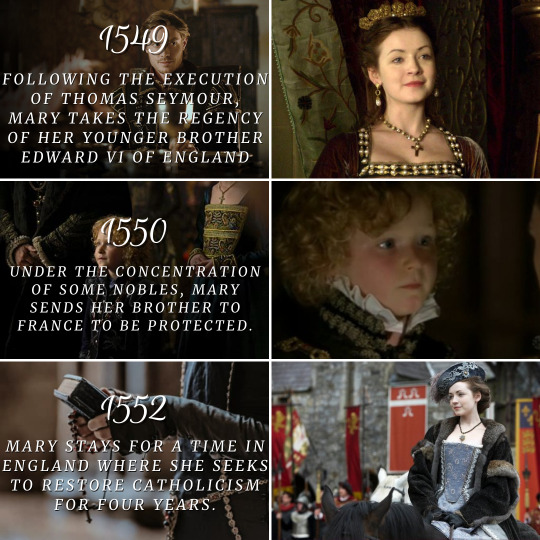
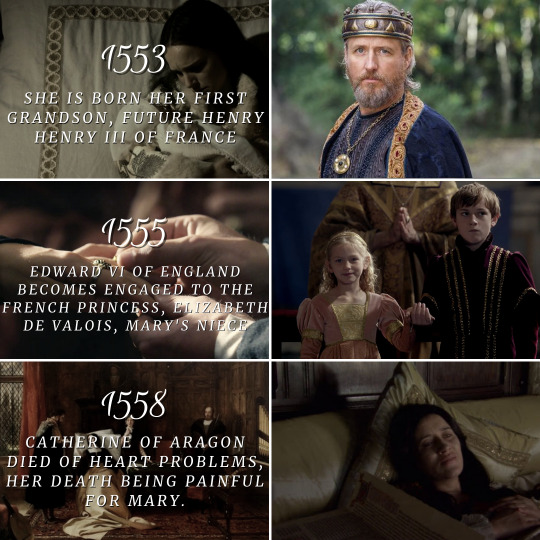
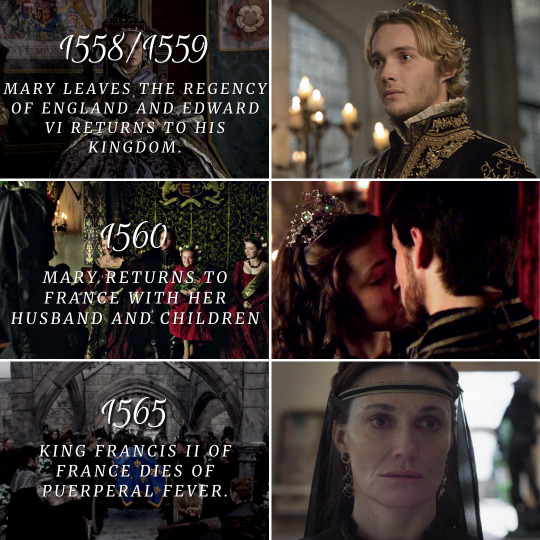
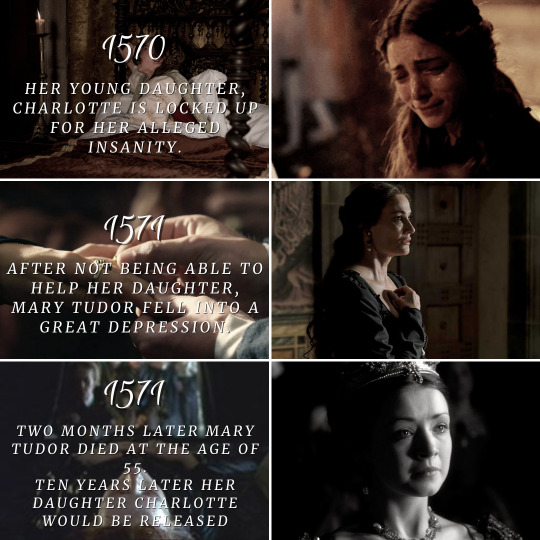
AU Austria: Best destinations for the wives of Felipe II of Spain (It should be clarified that he was not a good husband to say)
Mary Tudor- Queen consort of France (1516-1571)
Henry VIII of England was desperate, France did not want to form alliances with England trying to marry his daughter Elizabeth to the dauphin of France, Francis of Brittany. His second wife, Anne Boleyn tried to convince the French ambassadors to commit her only daughter to the dolphin, but Francis I of France would only accept an engagement to Mary, Henry VIII's legitimate daughter.
Mary had been a maid to her younger sister Elizabeth in Hatfield for two years now and had been declared illegitimate, but it is believed that Henry still had a fondness for her eldest daughter and even considered her favorite.
In the end, thanks to his best friend Charles Brandon and his lover, Jane Seymour, the king was convinced to legitimize his eldest daughter in secret from his wife, the Boleyns and Cromwells. Mary Tudor was called to her father at More's Castle, something that made many servants or the other nannies in the House of Elizabeth think.
Lady Maria was reunited with her father, who was said to hug her daughter for the joy of seeing her again. Henry VIII made a small ceremony where he legitimized his daughter in the eyes of the priest Thomas Cranmer, who was threatened with execution if he did not do what the King ordered, despite the fact that Cranmer was faithful to Anne Boleyn.
Maria was given back her title of Princess of England, Princess of Wales and above all the alliance with the dauphin Francis III of Brittany was signed, she also being a Dauphin of France and future Queen of France.
In the middle of the year 1535 while Henry VIII's birthday was being celebrated, the princess arrived with some of her ladies looking charming and beautiful. It is known that Ann Boleyn was about to faint when she saw her stepdaughter entering and that her husband received her with open arms, being the cherry on the cake that Henry VIII declared before the court to Mary Tudor as a legitimate daughter and therefore the current one. Princess of Wales above Princess Elizabeth.
After that news that scandalized all of England, Mary was returned to her rooms in Ludlow Castle and received a pension from her father, but the princess sent this money to her mother, Catherine of Aragon, who was in trouble. economic after being exiled. Although Mary hated Anne Boleyn, she always had a fondness for her younger sister, Elizabeth, and asked her father not to take away her comforts from the little girl after she stopped being Princess of Wales.
At the end of 1535 the princess left for France saying goodbye to her relatives and asked Alice Middleton, widow of Thomas Moro, to deliver a letter to her mother after her departure. On January 1, 1536, Maria arrived in France, being received by her father-in-law, her fiancée and her in-laws.
Mary and Francis fell in love at first sight and Francis is said to have called Mary "the most beautiful and cultured princess he has ever known." The wedding took place a month later in Marseille, being a great ceremony and the dolphins were acclaimed in France and England.
Mary was considered the desired queen after the death of Queen Claude in 1524 and they thought that she would bring color, peace and joy to France.
Francis and Mary settled in the duchy of Brittany where the princess sent some sums of money to her mother, Catherine secretly being Mary of Salinas the one who gave this money to her queen. While this was happening Ann Boleyn had an abortion and the king wanted to execute her under the crimes of adultery, witchcraft and incest, but in the end the second marriage of Henry VIII was declared void. Anne was exiled from the court and retired to a country house with her mother Isabel Howard.
At the end of the year 1536 Enrique married Jane Seymour and this managed to convince the king to be less harsh with Catherine of Aragon so he gave her first wife some fair amounts of money to eat. In 1537 Mary was born she had her first son, Henry who would be King of France as Henry II of France and this birth was taken with great joy for France.
That same year, her younger brother was born, Edward the desired Prince of Wales and María, together with her family, traveled to England where she became the godmother of her brother, treating him with great affection.
María had a good relationship with some of her political relatives, but her sister-in-law Catherine de Medici always saw her as a rival of hers since she wanted to sit on the French throne with her husband, Henry of Valois. In addition, Catherine envied Maria since she had a good marriage with Francis, and a very healthy male child, while she had children who presented some deformities or a delicate health and her husband Enrique was in love with his lover Diane de Poitiers at the same time. which gave all his attention.
In 1538 his first daughter was born, Catherine named in honor of her maternal grandmother Catherine of Aragón, this would be Queen consort of Spain as she was the second wife of Philip II. Two years later in 1540 Mary was born who would be Queen of Scotland by marrying the eldest son of James V, James VI of Scotland.
The birth of three healthy children increased Mary's popularity, in addition to the fact that she had made it fashionable to wear dark-hued dresses with diamonds as decoration, something unusual in the French court.
In 1541 her second son, Arthur, was born, who would become Duke of Orleans after the death of two of his cousins, Charles and Enrique. In 1543 her last daughter was born, Charlotte who would be Princess of Transylvania and her favorite.
Henry VIII died in the year 1547 being succeeded by the young Edward as Edward VI. Mary attended the coronation of her younger brother and asked permission to take her mother, Catherine of Aragón with her because she was already an older woman and it would be good to spend the last years happy with her. This was accepted by Edward VI due to the great affection he had for his older sister and María left with her mother for France but not without first recommending to her brother that he write letters in case he needs help and that he lean on his loyal advisor, Eustace Chapuys to deliver those letters because he knew that the King's uncles, Thomas and Edward Seymour would do everything possible to control the kingdom.
A few months after the death of Henry VIII of England, King Francis I of France passed away and the Dukes of Brittany were crowned, Francis being the second of his name. Mary made her mother her personal secretary, as well as being her loyal advisor, mother and daughter remaining very close.
In 1549 Thomas Seymour was executed on thirty-three counts of high treason. The Queen of France traveled to England and declared herself regent for the minority of her little brother. Although Mary was not very interested in politics, she knew that Edward Seymour, the brother of the late Thomas, would do his best to become regent and she did not want England to fall into the ambitious hands of the Seymours.
Her position as regent did not please the Protestants and some members of the court, but especially Edward Seymour who believed he had more right to be the regent of her nephew.
On January 23, 1550, Edward Seymour broke into the king's rooms to try to kidnap him, but the barking of Edward VI's favorite dog alerted the guards who arrested the Duke of Somerset. In the end Edward was imprisoned for treason and attempted murder of the king and half a year later he would be executed.
Mary, frightened by this situation, decided to send her younger brother to France to be under the protection of the king and people the queen trusted. The Queen's regency had many ups and downs due to her Catholic beliefs and her religious reforms to limit the power of Protestants whom she viewed as heretics.
The regent spent a year in England and a year in France trying to carry out her position as Queen consort of France, this being somewhat stressful for her.
In 1553 her grandson, Henry the future Henry III of France, was born and the queen loved her grandson very much, so much that she granted properties in the Duchy of Brittany for her enjoyment. Two years after the birth of her grandson, King Edward VI became engaged to the French princess Elizabeth de Valois who was the niece of Mary.
Her role as her regent was repeatedly engulfed by tensions between Catholics and Protestants, the latter being the ones who did not want a woman, much less a fervent Catholic, to rule in the name of her king.
These pressures and threats to her life caused different depressions for Mary, which were aggravated when her mother, Catherine of Aragón, died in 1558 due to heart problems at the age of 73.
The burial of her mother in the basilica of Saint-Denis, Mary Tudor left the regency of England when her brother Edward was 21 years old. Mary returned to France in 1560 with her family and continued her role as queen consort of France.
In 1565 her husband Francis hers began to have various health problems and died that same year from an alleged stomach cancer being the traumatic death of her for Maria who was still depressed by the death of her mother.
Despite these deaths, the widowed queen remained next to her children, especially next to hers, her first-born Henry of hers, who was crowned Henry II of France. The queen mother focused on leading a quiet and family life with some of her grandchildren, but it is known that she had many complications with her young daughter Charlotte who was Princess consort of Transylvania when she married Esteban Bathory and with him she had a marriage marked by the infidelities, jealousy and the supposed madness of the princess.
In 1570 Esteban Bathory died and his son Esteban “el negro” locked up his mother in a mental asylum for his supposed insanity. Maria tried her best to get her little girl out of there and return to France with her, but this was denied by her grandson and her court.
The confinement of the dowager princess made the French family begin to intrigue against the Bathory claiming that they were heretics who showed loyalty to Satan and that Charlotte, being a fervent Catholic, decided to get rid of her.
The health of the queen mother suffered after the confinement of the princess and she passed away at the end of the year 1571 at the age of 55. Ten years after her death, her grandson Esteban “el negro” died without issue, being succeeded by her younger brother Henry, who freed her mother, Charlotte from her, allowing her to return to her normal life.
AU Austria: Mejores destinos para las esposas de Felipe II de España (Cabe aclarar que el no fue un buen esposo que digamos)
María Tudor- Reina consorte de Francia (1516-1571)
Enrique VIII de Inglaterra estaba desesperado, Francia no quería formar alianzas con Inglaterra tratando de casar a su hija Isabel con el delfín de Francia, Francisco de Bretaña. Su segunda esposa, Ana Bolena trato de convencer a los embajadores franceses de comprometer a su única hija con el delfín, pero Francisco I de Francia solo aceptaría un compromiso con María, la hija legitima de Enrique VIII.
María llevaba ya dos años siendo criada de su hermana menor Isabel en Hatfield y había sido declarada ilegitima, pero se cree que Enrique todavía sentía aprecio por su hija mayor e incluso considerada su favorita.
Al final gracias a su mejor amigo Charles Brandon y a su amante, Jane Seymour, el rey fue convencido de legitimar a su hija mayor a escondidas de su esposa, los Bolena y Cromwell. María Tudor fue llamada ante su padre en el Castillo de More algo que hizo pensar a muchos criados o las otras niñeras de la Casa de Isabel.
Dama María se reencontró con su padre el cual se decía que abrazo a su hija por la alegría de volver a verla. Enrique VIII hizo una pequeña ceremonia donde legitimaba a su hija a los ojos del sacerdote Thomas Cranmer, quien fue amenazado con ser ejecutado si no hacía lo que el Rey ordenaba, pese a que Cranmer era fiel a Ana Bolena.
María le fue de vuelto su titulo de princesa de Inglaterra, princesa de Gales y sobre todo se firmo la alianza con el delfín Francisco III de Bretaña siendo también delfina de Francia y futura reina de Francia.
A mitades del año 1535 mientras se celebraba el cumpleaños de Enrique VIII, la princesa llego con algunas de sus damas luciendo encantadora y bella. Se sabe que Ana Bolena estuvo apunto de desmayarse al ver a su hijastra entrando y que su marido la recibiera con los brazos abiertos siendo la cereza en el pastel que Enrique VIII declarara ante la corte a María Tudor como hija legitima y por lo tanto la actual princesa de Gales por encima de la princesa Isabel.
Después de aquella noticia que escandalizo a toda Inglaterra María le fue devuelta sus habitaciones en el Castillo de Ludlow y recibió una pensión de su padre, pero la princesa destino este dinero a su madre Catalina de Aragón quien estaba en apuros económicos tras haber sido exiliada. María pese a que odiaba a Ana Bolena, siempre tuvo un cariño a su hermana menor Isabel y pidió a su padre que no le quitaran a la pequeña sus comodidades tras dejar de ser princesa de Gales.
A finales del 1535 la princesa partió hacia Francia despidiéndose de sus familiares y pidió a Alice Middleton, viuda de Thomas Moro que le entregara una carta a su madre después de su partida. El primero de enero del año 1536 María llego a Francia siendo recibida por su suegro, su prometido y su familia politica.
María y Francisco se enamoraron a primera vista y se dice que Francisco llamo a María “la princesa mas bella y mas culta que haya conocido”. La boda se celebro un mes después en Marsella siendo una gran ceremonia y los delfines fueron aclamados en Francia y en Inglaterra.
María era considerada como la reina deseada tras la muerte de la reina Claudia en 1524 y pensaban que ella traería color, paz y alegría a Francia.
Francisco y María se instalaron en el ducado de Bretaña donde la princesa enviaba algunas sumas de dinero a su madre, Catalina en secreto siendo María de Salinas la que entregaba este dinero a su reina. Mientras esto ocurría Ana Bolena tuvo un aborto y el rey quiso ejecutarla bajo los crímenes de adulterio, brujería e incesto, pero al final el segundo matrimonio de Enrique VIII fue declarado nulo. Ana fue exiliada de la corte y se retiro a una casa de campo junto a su madre Isabel Howard.
A finales del año 1536 Enrique se caso con Jane Seymour y esta logro convencer al rey de que fuera menos duro con Catalina de Aragón por lo que le entrego a su primera esposa algunas cantidades de dinero justas para comer. En 1537 nació María tuvo a su primer hijo, Enrique que sería Rey de Francia como Enrique II de Francia y este nacimiento fue tomado con gran alegría para Francia.
Ese mismo año nació su hermano menor, Eduardo el deseado príncipe de Gales y María junto a su familia viajaron a Inglaterra donde ella se convirtió en la madrina de su hermano, tratándolo con mucho cariño.
María tenia una buena relación con algunos de sus familiares políticos, pero su concuñada Catalina de Medici siempre la vio como una rival ya que ella quería sentarse en el trono francés junto a su marido, Enrique de Valois. Además Catalina envidiaba a María ya que ella tenia un buen matrimonio con Francis, y un hijo varón y muy sano, mientras que ella tenia hijos que presentaban algunas deformidades o una delicada salud y su esposo Enrique estaba enamorado de su amante Diane de Poitiers a la cual daba toda su atención.
En 1538 nació su primera hija, Catalina llamada en honor a su abuela materna Catalina de Aragón, esta sería Reina consorte de España al ser la segunda esposa de Felipe II. Dos años después en 1540 nació María que sería Reina de Escocia al casarse con el hijo mayor de Jacobo V, Jacobo VI de Escocia.
El nacimiento de tres hijos sanos aumento la popularidad de María, además de que ella había puesto de moda usar vestidos de tonos oscuros con diamantes como decoración, algo poco usual en la corte Francesa.
En 1541 nació su segundo hijo, Arturo que sería Duque de Orleans tras morir dos de sus primos, Carlos y Enrique. En 1543 nació su ultima hija, Carlota que sería Princesa de Transilvania y su favorita.
Enrique VIII falleció en el año 1547 siendo sucedido por el joven Eduardo como Eduardo VI. María asistió a la coronación de su hermano menor y pidió permiso para poder llevarse a su madre, Catalina de Aragón con ella debido a que ya era una mujer mayor y sería bueno pasar sus últimos años feliz. Esto fue aceptado por Eduardo VI por el gran cariño que tenia hacia su hermana mayor y María partió junto a su madre a Francia no sin antes recomendarle a su hermano que le escriba cartas por si necesita ayuda y que se apoye en su leal consejero, Eustace Chapuys para entregar aquellas cartas debido a que sabía que los tíos del Rey, Thomas y Edward Seymour harían todo lo posible por controlar el reino.
Unos meses después del fallecimiento de Enrique VIII de Inglaterra, falleció el rey Francisco I de Francia y los duques de Bretaña fueron coronados siendo Francisco el segundo de su nombre. María hizo a su madre su secretaria personal, además de ser su leal consejera permaneciendo madre e hija muy unidas.
En 1549 Thomas Seymour fue ejecutado por treinta y tres cargos de alta traición. La reina de Francia viajo a Inglaterra y se declaro regente por la minoría de edad de su hermano pequeño. Pesé a que María no estaba muy interesada en la politica, ella sabía que Edward Seymour, el hermano del fallecido Thomas, haría lo posible para llegar a ser regente y ella no deseaba que Inglaterra callera en las manos ambiciosas de los Seymour.
Su puesto como regente no agrado a los protestantes y algunos miembros de la corte, pero en especial a Edward Seymour que creía que tenia mas derecho a ser el regente de su sobrino.
El 23 de enero del año 1550 Edward Seymour irrumpió en las habitaciones del rey para tratar de secuestrarlo, pero los ladridos del perro favorito de Eduardo VI alertaron a los guardias que detuvieron al duque de Somerset. Al final Edward fue encarcelado por traición e intento de asesinato al rey y medio año después sería ejecutado.
María asustada por esta situación decidió enviar a su hermano menor a Francia para que estuviera bajo la protección del rey y de personas en las que la reina confiaba. La regencia de la Reina tuvo muchos altibajos debido a sus creencias católicas y a sus reformas religiosas para limitar el poder de los protestantes a los cuales veía como herejes.
La regente pasaba un año en Inglaterra y un año en Francia tratando de desempeñar su cargo como Reina consorte de Francia, siendo esto algo estresante para ella.
En 1553 nació su nieto, Enrique futuro Enrique III de Francia y la reina amo mucho a su nieto, tanto que concedió unas propiedades en el ducado de Bretaña para su disfrute. Dos años después del nacimiento de su nieto, el rey Eduardo VI se comprometió con la princesa francesa Isabel de Valois que era la sobrina de María.
Su papel como regente se vio varias veces enfrascado por las tensiones entre católicos y protestantes siendo estos últimos los que no deseaban que una mujer y mucho menos una ferviente católica gobernase en nombre de su rey.
Estas presiones y amenazas a su vida le causaron distintas depresiones a María que se agraviaron cuando en 1558 falleció su madre, Catalina de Aragón por problemas cardiacos a los 73 años.
El entierro de su madre en la basílica de Saint-Denis, María Tudor dejo la regencia de Inglaterra cuando su hermano Eduardo tenia 21 años. María regreso a Francia en 1560 junto a su familia y continuo su papel como reina consorte de Francia.
En 1565 su marido Francisco empezó a tener diversos problemas de salud y falleció ese mismo año por un supuesto cáncer de estomago siendo su muerte traumática para María que estaba todavía deprimida por la muerte de su madre.
Pese a estas muertes la reina viuda se mantuvo al lado de sus hijos sobre todo al lado de su primogénito Enrique que fue coronado como Enrique II de Francia. La reina madre se centro en llevar una vida tranquila y familiar junto algunos de sus nietos, pero se sabe que tuvo muchas complicaciones con su hija pequeña Carlota que era Princesa consorte de Transilvania al casarse con Esteban Bathory y con este tuvo un matrimonio marcado por las infidelidades, los celos y por la supuesta locura de la princesa.
En 1570 falleció Esteban Bathory y su hijo Esteban “el negro” encerró a su madre en un asilo mental por su supuesta locura. María trato lo posible para que su pequeña saliera de ahí y regresara a Francia junto a ella, pero esto le fue negado por su nieto y su corte.
El encierro de la princesa viuda hizo que la familia francesa empezase a intrigar en contra de los Bathory afirmando que ellos eran herejes que mostraban lealtad a satanás y que Carlota al ser una ferviente católica decidieron deshacerse de ella.
La salud de la reina madre se vio resentida tras el encierro de la princesa y falleció a finales del año 1571 a los 55 años de edad. Diez años después de su muerte, su nieto Esteban “el negro” falleció sin descendencia siendo sucedido por su hermano menor Enrique el cual libero a su madre, Carlota de su encierro permitiéndola regresar a su vida normal.
#mary i of england#mary tudor#henry VIII of england#francis of france#francis of brittany#philip ii of spain
53 notes
·
View notes
Text
Elizabeth 'Liz' Seymour
Sixtended OC

Elizabeth Seymour is the second youngest daughter of Margery Wentworth and John Seymour, making her the Queen Jane Seymour's sister.
After marrying her first husband, Anthony Ughtred, the couple had two children; Henry Ughtred and Margery Ughtred. However, after four years of marriage, Anthony died, and left Elizabeth as a widow.
Elizabeth married Gregory Cromwell three years later, getting five children with him. Henry, Edward, Thomas, Katherine, Frances Cromwell. Gregory died from the sweating sickness, leaving Elizabeth as a widow, yet again.
Her last marriage was with John Paulet, who also outlived Elizabeth. This marriage was the only one without children. However, there are not much details known.
After Elizabeth was reincarnated into the modern world at age nineteen, she was dedicated to get the most out of her life. She was taken in by Isabella Trastámara, who became her roommate. (Oh my God they were roommates)
Two years later, Isabella and Elizabeth went to a party and got wasted. In that drunken night, Elizabeth came out as a lesbian to Isabella, the pair slept together, and woke up feeling quite hungover and awkward.
Elizabeth, who has become much more confident, and teasy during the past years in the modern life, found herself feeling like she messed up with Isabella. However, she forced herself to pull it together and teased Isabella about it. This happened two more times, one while drunk, and one while sober, before agreeing to become friends with benefits. However, Elizabeth quickly realized that her feelings were more than just friendly, and so began a journey of heartbreak, as Isabella surely did not return the feeling. This went on for multiple years.
Elizabeth and Katherine Tudor are quite good friends as well. They met in Katherine's own bakery, The Tudor Rose, after she started a conversation. Since then, Katherine and Elizabeth have been close friends, with Katherine considering Elizabeth kind of her aunt.
Elizabeth's relationship with her sister, Jane Seymour, is a bit more strained. As in her past life, Jane did not include Elizabeth in her household, so naturally, there is bad tension between the two. But Elizabeth is trying to mend their relationship, as she missed her sister. Lately, she has been noticing a good shift in Jane's behaviour towards her, as well as Catalina's.
Elizabeth is suprisingly good friends with Catherine Parr, as they both immediately bonded over their love for books. They are often found together, reading books and just quietly chatting about them. With, Anne Boleyn and Anna of Cleves, it's a same story. The three can get along pretty well. However, between Katherine Howard and Elizabeth, it's a bit strange as Katherine often feels uncomfortable around Elizabeth—who has no idea why, but she's dedicated to find out.
Elizabeth's interests are mostly books, music and sports. She goes out for a run nearly everyday, and curls into a ball on the couch to read a book after a nice long bath. And even though she has bad social anxiety, she won't say no to a good party to relieve some stress. However, this often leads to awkward rejections, as Elizabeth flirts unintentionally.
Overall, Elizabeth wants to get most out of her second chance at life, and wants to have an eventful life. And while being considered the 'chaotic lesbian wine aunt', she's not going to back down.
Mentioned: @lexartsstuff's Isabella Trastámara, @ellielovesdrawing's Katherine Tudor.
#sixtended#sixtended au#sixtended verse#sixtended oc#nessa's art#Elizabeth seymour#six the musical#jane seymour#catherine of aragon#anne boleyn#catherine parr#anna of cleves#katherine howard#katherine tudor#lexartstuff#ellielovesdrawing#isabella trastámara#elizabeth seymour (sixtended)
37 notes
·
View notes
Text
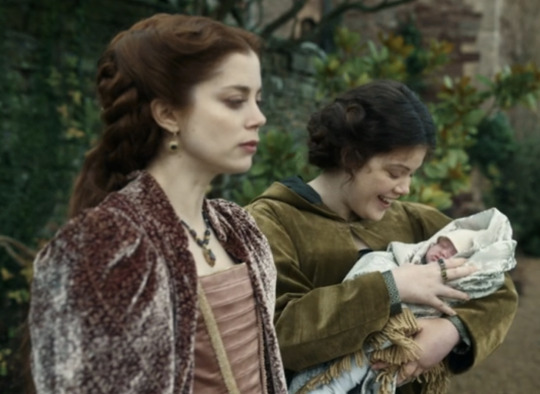

Isn’t she just delightful?
Catherine of Aragon has one of the more fascinating media legacies of anyone in the Tudor period, not in terms of how her image has fluctuated over the years, but because of how notably it hasn’t. Other hardcore Catholics of the Henrician court are inevitably vilified in stories from Protestant perspectives - Thomas More, Cardinal Wolsey, Jane Seymour and above all else Mary I, to name a few. “Protestant perspectives” doesn’t just refer to reformation texts, it includes books from the perspective of Protestant figures; usually Anne Boleyn or Elizabeth I, and more recently Thomas Cromwell with Hilary Mantel’s Wolf Hall books. Despite her unwavering faith in both the Catholic Church and her own position, Catherine’s reputation has, up until the past twenty years or so, remained close to stellar; her marriage into the English monarchy at a young age did well to divorce her from her parent’s religious persecutions, and her death some fifteen years or so before her daughter took the throne kept her from being tarnished by association to Mary’s resurrection of medieval heresy laws.
As a Tudor queen, Catherine has largely gone down in history for her irreproachable conduct, even after that history began to tilt towards the side of a religion she opposed - she is known for her charity, her piety, and her belief in her husband’s good nature no matter how vile his behavior grew to be, even at the expense of her own self image. According to Chapuys (who in this case there is no reason to disbelieve) she went to her grave questioning wether Henry’s actions after their divorce was her fault, wondering wether, if she had given him what he wanted, he may not have felt the need to break from Rome, mistreat their daughter and execute two men - one a long term friend and one his own grandmother’s religious advisor. Catherine is a noble figure, she is a tragic figure, she is most of all a dignified figure, and in Tudor media she is always given at least a sympathetic nod if not a complex or three dimensional portrayal.
The key phrase there, though, is as a Tudor queen. Whatever else she was, Catherine was decidedly not a modern woman, just like all of her female peers living five hundred years ago were decidedly not modern women; her unflinching religious beliefs, her many attempts at producing a male heir and her devotion to her marriage are admirable traits of a female noble of the sixteenth century, less so of a twenty first century wife or businesswoman. She was a product of her time, and modernized or semi modernized Tudor media’s attempts to portray her - specifically the brand of modern Tudor media that sets out to depict Anne and Henry’s relationship as one of Sexy High Romance - always end up turning Catherine into a misogynistic caricature of herself, historical legacy be damned. The blog anneboleynnovels describes it best:
“Catherine’s greatest hurdle has been not Protestant novels, but modernized ones. These are the one subgenre in which her character at best is severely degraded and at worst is completely unrecognizable. It’s not surprising that it should be like this — finding modern corollaries to Anne and Henry, whether in an office, a Hollywood mansion, or a high school, is doable. As for most of the people who surrounded them, while some some people are harder to wrench into modern poses than others, it’s relatively easy to cut and alter those characters to make them work better in a modern setting. Catherine, however, is completely lost here. She needs to exist, or else the central conflict disappears — but she simply doesn’t have a real modern equivalent, at least not in the kinds of societies that modernizers write about; her determination that God had put her in her position and that she had to safeguard her daughter’s legitimacy, and thus her inheritance, is impossible to convey fully, especially since Henry’s historical behavior — taking a presumed inheritance from Mary, forcibly separating the two women, and confining them in residences of his choosing — can’t be precisely replicated in a modern novel without making him at best a creep and at worst a criminal. In neither case would that Henry be an appealing love object for a modern Anne, so his behavior is inevitably made more standard — he’s simply a wealthy man divorcing his wife of twenty years, and instead of taking her settlement and moving on, his wife just refuses to let go.”
As the post on Catherine’s fictionalized history points out, attempts to judge her through a modern lens, particularly in stories that center around that grand, not-at-all-murderous love affair of Henry VIII and Anne Boleyn inevitably fail to produce a balanced assesment. Susan Bordo’s highly modernized study the Creation of Anne Boleyn treats her like a footnote at best and a self righteous fool at worst, while the Catherine of Suzannah Dunn’s The Queen of Subtleties is disgustingly nicknamed “Fat Cath” (stupid cow, how could she let herself go like that after six pregnancies?) and features its leading lady, another ahead-of-her-time portrayal of Anne Boleyn, going out of her way to condescendingly paint Catherine to the reader as vengeful and delusional. Anne of Hollywood and Anne and Henry present the worst portrayals, one a hideous, deliberately unsympathetic drug addict and the other a teenage psychotic forced on Henry by his father, leading her poor, brow beaten boyfriend by the hand.
That’s not to say it would be impossible to write a well rounded modern Catherine of Aragon, but most modernized Tudor novels simply don’t care to try and make her well rounded; she exists solely to be the convenient road block to Anne and a whitewashed Henry’s happiness, a flat example of the Hysterical Woman trope rather than a Queen, a mother, or a politician. It isn’t Anne Boleyn’s fault that this happens (she can’t exactly object) but this version of Catherine never fails to rear its ugly head in Tudor media that aims to portray Anne, literally or figuratively, as a “woman of the future.” Since that reading of Anne has gained momentum over the years, this Catherine inevitably does so too.
What makes the Spanish Princess so unbearable is how blatantly Emma Frost is trying, and egregiously failing, to flip the script on this. Whatever her personal dislike of Anne Boleyn, she is very obviously trying to take this fictitious version of Anne Boleyn that has sprung up over the past few decades - that of the rebellious, sexy, pseudo feminist Modern Woman™ - and apply it to Catherine of Aragon, who was neither rebellious, a feminist or, after six pregnancies, five infant deaths and a battle with heart cancer, all that sexy. The intimacy and very real affection she and Henry shared in the early years of their marriage is stilted and unemotional, replaced by an absurd number of sex scenes and a very out of place “warrior kween” nickname. It isn’t enough for Catherine to organize a massive military campaign and give a speech to an assembly of soldiers while heavily pregnant, real life accomplishments of hers which have gone largely unacknowledged - no, the Catherine of the Spanish Princess needs to literally fight in battle, pregnant belly armor and all, subtly implying that her many miscarriages were the result of her own behavior, never mind the fact that Henry’s later wives had miscarriages as well. The deeply devoted friends Catherine actually had, one of whom served her for decades and risked royal punishment to be with her on her deathbed, are either erased entirely or put into invented conflicts with her. Her relationship with the only one of her children that survived infancy is perverted into a cold, uncaring motherhood, marked by disappointment and a refusal to even hold her daughter, let alone personally teach her Latin, commission scholars to write books for her, and request those same scholars take charge of her education.
In place of all these details, the things that make the historically minded audience love Catherine in the first place, several sordid aspects of Anne Boleyn’s fictional representations are assigned to Frost’s Catherine of The Upside Down: the ~unnatural~ blowjobs and poorly designed French hoods, the general air of cattiness, the excessive nudity, the hatred of her daughter, the inability to sexually please her husband, and the weird sense of anger at all the women in her life all stand out as hallmarks of Anne Boleyn’s less flattering portrayals, but so too do the clear attempts to pander to a feminist audience and sell itself as new age and progressive.
The fouler examples of Catherine as a modern woman aren’t yet the prevalent perception of her; a gaggle of misguided twenty first century books isn’t enough to erase the near spotless reputation she’s maintained for half a millennium. But the Spanish Princess fails to depict a more positive modernization of Catherine because it’s lazy in the attempt - it sees the habit of trying to turn sixteenth century queens into anything but sixteenth century queens and tries to replicate it by taking a handful of theatrical trends and having their protagonist perform them. Those trends have been apart of Anne Boleyn’s portrayal in the media for so long it wouldn’t be that strange to see her acting that way on screen, no matter how historically inaccurate they may be, but to assign them to someone with such a vastly different public history as Catherine is just jarring. She wasn’t like that, nobody thinks she was like that, Tudor media has always known her as being not like that, and the result is something that’s confusing at best and outright offensive at worst. It’s not fun to watch, but it’s interesting to examine, broader context in mind.
(Also credit to @queenmarytudor for that image of Meg and Mary, and seriously, check out anneboleynnovels. They’re great.)
#the spanish princess#Catherine of Aragon#the Tudors#henry viii#also I should say that I am not in any way a historian and you should take what I say with a massive grain of salt#this is just what I think
96 notes
·
View notes
Note
Heartbreaking thought: since in Crown of Ashes, Mary never found out about the OT3, Cat/Felipe/Ana weren’t raised to think of Thomas as their grandfather, and unless their aunts/uncles can explain the truth to them when they’re old enough, they probably despise him/blame him for everything that happened.
I did not actually think of that at all but OW. I actually (some babbling)
I’d thought, in my head that they knew. Actually in my head I think of it as Phillip knowing (he hasn’t confirmed anything, he isn’t going to ask but he spotted it. Actually a really heartbreaking thing might be that either Phillip raised it, wasn’t disgusted enough and it sparked everything off or someone told Mary that he knew and hadn’t spoken about it)*
*Just about Henry/Thomas - not about the triad because the triad would not as a concept occur to people at all and here Mary doesn’t put it together. Honestly she might not put it together…I think I wrote out the point of divergence as to why she didn’t somewhere but trauma brain has lost that reason :/.
So like in my head, they knew in a small child way and I don’t know why that was but they did.
(They may well have still gone through a period of blaming Thomas. Or blaming Phillip. Or both. They might not but)
(I keep wondering if any of the boleyn-tudor-cromwell kids are angry at their parents at any point honestly. Except that I really do know that Elizabeth at least hears that Anne was absolutely ready to say she wasn’t Queen for the chance to stay with her babies, that Thomas tried to blame everything on himself, that Henry would have done anything if it meant he could see his children again so they come back to not. Though G-d the moment when the Dudleys explain things to Elizabeth is…Something that I probably need to write).
(Why it is in my head they knew? Maybe that because they grew up so close to their aunts and uncles they just kind of picked up the vibe or one of their age mate kids said something but it never actually occurred to them to tell their mother because like, why? I don’t even know it was just…cemented in my brain)
(Maybe it was just that Thomas Cromwell was part of the family without them knowing what his role was. That might be the most likely. Like, one of their grandparents close friends and also We Are Adopting You As Grandpa in the way that happens sometimes with close family friends (like I’m Auntie to the kids of my close friends))
#lil and her ridiculous aus#ot3: political power trio#au: crown of ashes#tudors ot3 verse reference#fic
7 notes
·
View notes
Note
btw Why are you so interested in my project?
Have you ever been in that situation where you liked or disliked a character for no reason, not because you had any concrete evidence either way, just on instinct?
Or when the picture presented by everyone demanded the exact opposite reaction, but nevertheless you went on feeling this taboo like / dislike anyway?
I've got that strange leaning towards the 3rd Duke and I have no idea why.
Every book I have depicts him in a poor light, but somehow the idea I 'must' hate him, on moral grounds, has never sunk in, and I still felt positive towards him in a quiet, low-key sense.
I originally put it down to some blanket approval of Anne's relatives, but then, outside of her core family, I don't care about or even really like the paternal side, such as the Sheltons or Sackvilles.
A voice always said to me:
There must be more to it than this.
Perhaps it's merely a knack of mine where I just 'know' when an attitude or argument presented is 'off' in some way, even if I have no reason to disbelieve it and can't say at this very moment why I distrust it, but regardless I sense a lack of sincerity.
As an example, the first Tudor book I ever read as a child was Alison Weir's Six Wives, after which my favourites were Anne Boleyn, Elizabeth I and Katherine Howard.
Looking back, it baffles me how I made that decision, when she hardly says a pleasant word about any of them.
Somehow, every time I found a nasty remark, or supposed crime of theirs, though this was the first and only source of information I had, I thought:
Nah, that doesn't sound right to me.
So I ignored it, and later on found my instinct was correct, and if I have a similar attitude to the 3rd Duke, there must be something missing from the popular view.
A lot of the things he's known for don't make sense.
• Threatening to smash Princess Mary's head against the wall, yet she released him from prison and trusted him to face down Wyatt, even when it's a rebellion in favour of his great niece.
• The implication from that of being violent to his own daughters, yet Mary Howard took his side during the breakdown of his marriage, and he left her money even after she testified against him, so he accepted she had no choice.
• Thinking well of him means doubting the word of his wife, and I don't want to, but much of what Elizabeth Stafford says sounds like lashing out from deep-rooted heartbreak over him taking a mistress.
You don't hear of any trouble between them until that point, and her refusing a divorce, as in not wanting to be free of a violent husband, is what I can't understand.
If, as I say, it all does originate in jealousy of Bess Holland, he had to be better than his reputation implies to inspire that feeling in her, particularly considering the age gap and when she was so set on marrying Ralph.
• This idea he and Anne became enemies, but he cried when sentencing her to death.
Another confession reminded me of how his animosity towards Cromwell only becomes visible then, once she's gone.
The sentiment in me thinks the crowing the Howards did about bringing him down has to be more personal than just anger over the monasteries, even if they were affected by it, particularly when coupled with the hatred between them and the Seymours.
• Him being famed as THE Catholic peer of the age, yet he ended up with 'heretic' children, so any 'wrath' he had was plainly ignored by them.
Although he had to be quite the force if he managed to undo all Mary Howard's work and turn the 4th Duke and his sister back to Catholicism, which did 'em no good at all!
Then the mysteries and emotions:
• He's always shown as permanently old, a bit doddery even, but like his father, having to wage war when he should be putting his feet up, and STILL coming out in one piece!
How did he do that?
• He had an entire other family before Elizabeth came along, but every one of them died and is never mentioned, so he just got up and started all over again.
What was that like? How did he feel when they were all gone?
And the worst part is to think, had they lived, Henry VIII would wipe them out as Yorkists.
• Very early on in my Tudor obsession, I found a quote, I can't recall where, which said the 2nd Duke was a cold, distant presence to his son, so when Surrey was born the 3rd Duke worshipped him.
It's difficult not to conclude that, when both were in the Tower, Thomas had to wish he'd died first and Henry had been spared by the King's death, as living without him was worse.
The Howards and all the various offshoots are my main interest. Too many of them meet violent deaths and it gives them a gothic, quite romantic appeal. Each time I find the name, I know I'm dealing with an interesting character.
And they all look so alike! The dark eyes, red hair, long face and nose, high cheekbones. You can tell one right away!
If my central interest is the Boleyn end, about the Earl, the Countess, Anne, George and Mary, my second would be the Duke, the Duchess, Henry, Mary and Thomas.
So much about them fascinates me:
• Why did Henry throw his life away? How could he ever have believed he'd get away with it?
• Mary came to court as Anne Boleyn's lady and served all her successors EXCEPT Jane Seymour, and wouldn't marry her brother.
Some versions I've read doubt the closeness between Anne and Mary, but I wonder if her reaction to Anne's death was similar to Surrey to FitzRoy's.
How much resentment did she, did all of them, hold towards the Seymours, and how influential was Anne on Mary and Henry's religious beliefs?
• Had FitzRoy lived, would Henry VIII have tried to legitimize him, set he and Mary up as 'Plan B', or at least make him regent?
Just imagine the A.U.: Edward leaves the throne to him, so instead of everyone flocking to Mary I, it's the choice between an unmarried woman and a grown man with a family.
And Mary Howard's queen!
• Also, that Mary is technically the 'sister' of Mary and Elizabeth, but this isn't brought up at all.
• Bindon was there all along but is completely forgotten, yet in my head he had to met Princess Elizabeth along the way for her to give him a title, but when, why and how?
Totally ignored, yet he lived the longest.
• What about Katherine and Muriel? The 3rd Duke's Wikipædia entry won't admit they existed.
I'd buy books about them, but I've got no money.
I remember you followed me after I wrote a post on the 3rd Duke, so I associate him with you, and no one else here ever has a good word to say about him, if he is mentioned.
It'd make a change to see a positive post, and find out if that inexplicable feeling I had was leading me in the right direction all along.
6 notes
·
View notes
Note
Honestly AUs where Henry's wife at the time is widowed earlier than irl always fascinated me, so could you discuss the first 5 queens being a widow if possible?
Ooh alright
So I’m assuming, absolutely everything else is the same—the only difference is that Henry dies? Okay.
Um...with Catherine of Aragon, let’s say he doesn’t die until after her last pregnancy but before the Great Matter...so let’s say 1523-24? Obviously Mary would become Queen, there’s really no other alternative. And only being about 7-8, of course she’d need a regent or a regency council. It probably would’ve been Catherine herself plus a few others like maybe Norfolk and Suffolk and Wolsey. Would Catherine have re-married? Unlikely. I’m sure she would’ve wanted to dedicate herself entirely to the regency and Mary’s upbringing.
Anne Boleyn — Let’s say he dies in that 1536 jousting accident. And since we’re keeping everything the same, Anne still miscarries her baby. Then Elizabeth would become Queen and I think Anne would be made regent. Or, if we’re going for a whole regency council situation rather than just a single regent then Anne + George Boleyn, Thomas Boleyn, Thomas Cromwell...maybe even Edward Seymour? As with Catherine, I think it’s unlikely Anne would re-marry. Not only because she would want to focus on Elizabeth but also, on a more personal level I think she considered Henry to be the love of her life.
Jane Seymour — So, role reversal, Henry dies and Jane doesn’t. Let’s just say he dies in like early 1538. Edward becomes King but I don’t think Henry would make Jane regent. Unlike with Catherine and Anne, Henry really didn’t have any expectations for Jane to be political at all. Not to mention, he didn’t respect her like he respected Catherine and Anne. I think basically the same people who were appointed to Edward’s regency council in real life would also be appointed in this situation. Maybe with a few differences. What’s interesting is, I’m sure Jane would’ve tried to fight to have Edward raised as a Catholic but ultimately I think she would’ve lost that battle. Would she have re-married? Depends. If we think she genuinely loved Henry then probably not. If we think she only married Henry for power then it wouldn’t really make a lot of sense for her to re-marry because then she could potentially lose any power she had as the King’s mother. If we think that she was forced to marry Henry against her will then maybe? Maybe being the mother of the King would make her feel empowered enough to make her own choices and not let her family control her anymore.
Anna of Cleves — So Henry dies at some point during their marriage. I wonder how generous he would be to her as Dowager Queen? I mean, he was generous in the divorce settlement but that was because she didn’t fight it like Catherine had. But if Henry dies while they’re still married, he probably still dislikes her quite a lot. I wonder if she would just go back to Cleves? I mean, she’d really have no reason to stay. Like Mary Tudor went back to England after Louis XII died. Mary Stuart went back to Scotland after Francis died. So yeah...usually if a woman goes to a foreign country to marry but her husband dies without them having any children, then the woman just goes back to her home country. Her brother would probably arrange another marriage for her and that would be that.
Katheryn Howard — Let’s say Henry dies before he gets any suspicion of her affair (although Henry dying while she’s imprisoned could be an interesting concept). So if Henry dies while their marriage is still good, I’m sure he’d be very generous to her in his will. She’d probably get the same treatment as Kathryn Parr. If she’s allowed to re-marry, honestly I think she’d marry Culpepper since they’d already been planning/talking about getting married before Katheryn married Henry. I don’t want her to marry Culpepper because I think that marriage would be a disaster for her. But, realistically, I just think that’s what would happen. Although, silver lining, if Culpepper tries to take advantage of her position as Dowager Queen and get himself involved in politics then it’s possible he could be executed. Other than the Culpepper marriage, I think Katheryn would have quite a nice, comfortable life.
Of course, if you were writing a fan fiction, you could fill in all the details however you like. These are just my basic thoughts.
#henry viii#catherine of aragon#katherine of aragon#anne boleyn#jane seymour#anna of cleves#anne of cleves#katheryn howard#katherine howard#catherine howard#anonymous#ask
12 notes
·
View notes
Text
How I would change The Tudor seasons
Hello! I am making this post since I wished there were much more seasons of The Tudor to flesh out characters and not rush through the reigns of the queens. All of these seaosn will have 10 episodes, just like how 3 out of the 4 seasons in this show had 10 episodes.
SEASON 1 (1485-1509)
Introduce baby Katherine of Aragon, baby Prince Arthur, Baby Margaret, Baby Mary, and Baby Henry. This season will be focused on Katherine growing up and marrying Arthur (that is how the first or second episode will cover) and it goes up until when Henry and Katherine are crowned. Something like the Spanish Princess. Show baby Boleyns and how they grow up as little kids! But make them background characters. overtime, make Margaret show up less and less after she becomes Queen of Scotland. Also show Jane Seymour being born.
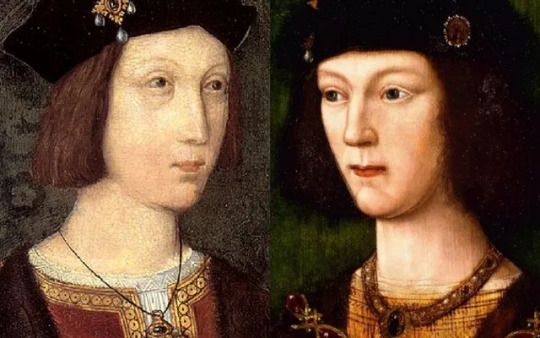
SEASON 2 (1509-1522)
Show the struggles of Katherine is having with making a male heir while Henry keeps reminded her that the Tudor dynasty is still new. Show Mary Tudor marrying Charles Brandon and how he gets his titles Don’t show him too much tho.Show Mary and Anne Boleyn is French court, and how Anne flourishes. Do a sneak peak of a baby being born here and there, for Kateryn Parr and Anna von Kleve. Oh, and Mary I also. Show the affair of Bessie Blount in this season. Give much more friendship times with More and Henry also. The season ends when Anne Boleyn arrives at English court.
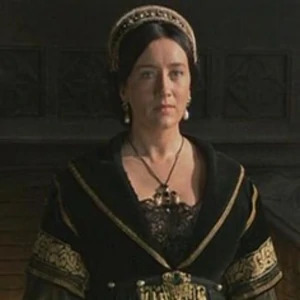
SEASON 3 (1523-1532)
Overall, something like the 1st season of The Tudors a bit. The first episode shows the affair of Henry VIII and Mary Boleyn and the love of Henry Percy and Anne Boleyn and both ending at the same time. It ends with Katherine of Aragon forced to leave court, and how Henry’s sister Mary trying to keep her sister-in-law in power and how Queen Margaret of Scotland wants Anne be queen. Show the first marriage of Kateryn Parr a bit and show when Katheryn Howard is being born. You can include Anne Boleyn knowing about this, saying that “child wont go anywhere in life” since Katheryn is so low on the noble status. This is foreshadowing. Show bits of Anna von Kleve of getting a betroth of the man. he main focus will be Anne Boleyn though as she becomes Henry’s lover and they wish to be married. Kill off Wolsey too and watch Thomas Cromwell come into power. Now Thomas Tallis also I hate him.
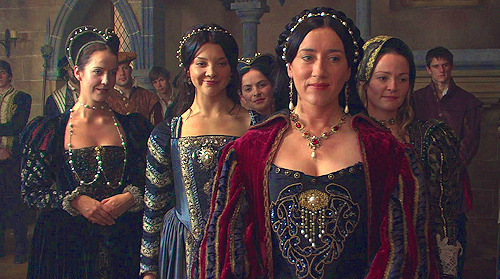
SEASON 4 (1532-1536)
The main story will just be like the main story line of the original Season 2, since I feel like it is the best season out of the four. Things I will change is to introduce Jane Seymour much earlier in the season, with her struggle how she wants Lady Mary Tudor in the line of succession and her issues of breaking from Rome and how she becomes queen consort. Kill off Duchess Lady Mary Tudor Brandon, and possibly her last words can curse how much she hates Anne Boleyn. cough, foreshadowing. Show bits of Katheryn Howard as a teen and the predatory nature of her music teacher, so we can gain some sympathy for her since she is shown a dis-likable character in the show. Start to show more of Lady Mary Tudor a bit more too. Show the marriage of John Neville and Kateryn Parr and how Kateryn is good with his children, showing that she can make a great mother to stepchildren. The end of the season would be almost the exactly like the last episode of Season 2, since that is one the the best episodes.
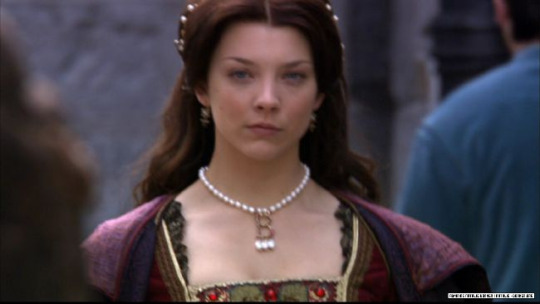
SEASON 5 (1536- 1540)
This is around the time of the original Season 3, which was the most boring season, so there is a lot of changes to this one. Jane Seymour will be shown more in this season, because I think many people view her as boring and I want to show her the sides of her that aren’t really shown. Show her as being more gentle and somewhat trying to get Lady Mary in the line of succession. Her struggles of not getting pregnant immediately should be shown more, as she is constantly reminded what happened to the last queen. The main focus however will be Thomas Cromwell. He starts to feel a bit guilty of what happened to Anne Boleyn because inside he knows they were innocent, however he had to serve his king either way. Season 3 only had 8 episodes, yet this one will have the standard 10 to flesh things out. It will show Cromwell’s positions in the monasteries and Aske’s rebellion. Kateryn Parr is shown to be nervous about this. When Jane is finally pregnant, her anxiety gets worse as she does not know if it will be a boy or girl. I want the viewers to know that at this point it is very stressful of Jane. Show the predatory nature of Francis Dereham to Katheryn Howard also and how it is r*pe, not a love affair like it is shown in The Tudors. Jane dies in the fourth episode and now Thomas Cromwell has to fond a new task, to find a queen for Henry VIII, who is so protective over his baby son. He wants to find a woman that would not be beheaded just like Anne Boleyn, since his guilt is piling up more and more. Soon, he chooses Anna von Kleve, who throughout the season is shown not to know sex education. At the end of the season, it is Henry screaming, “I like her not!” and it shows Cromwell’s worried face, touching his neck and the episode ends.
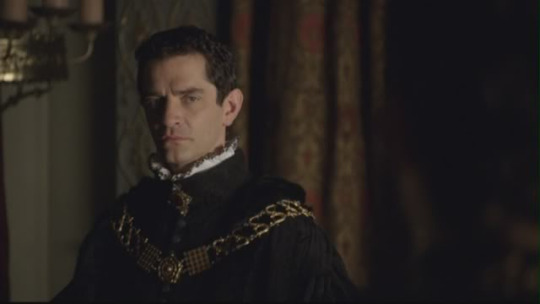
SEASON 6 (1540-1542)
This season will show the reigns of Anna von Kleve and Katheryn Howard. The main focus will be on Cromwell still, as he tries to make Anna do anything to keep his head. However, Anna still does not understand and wishes to also divorce Henry VIII. Show Anna interacting with Henry’s kids, and have a flashback to Henry’s sister Mary, showing Henry is reminded of his sister from her. For Katheryn Howard, I am very unsure. If it is like the original show how she is claimed to be a “prostitute” by Brandon and someone else, then I would just say since all of this predatory experience from a young age, she thinks the only purpose she has is to be a sexual object for a man, which makes her story sadder. Or she can just go by the history of how she just comes to court and Henry VIII, who is now aging and weighing more, can see her. At the end of Anna’s reign as queen, Cromwell is imprisoned and the night before his head gets chopped off, he thinks about Anne Boleyn and says, “you got the last laugh”. When Katheryn and Henry marry, someone tells Henry about the gruesome death of Cromwell and Katheryn can secretly think, that’s what he gets for killing my cousin. Anna and Henry do not have sex at all, yet remain good friends. Anyway Henry treats Katheryn like an object until Culpepper meets her and actually treat her like a person,only to trick her for sexual purposes only. Everyone hears and she gets executed. This makes her a tragic character and much more realistic way. The season can end with that, or Anna saying how she is lucky she was not the second beheaded of the wives.
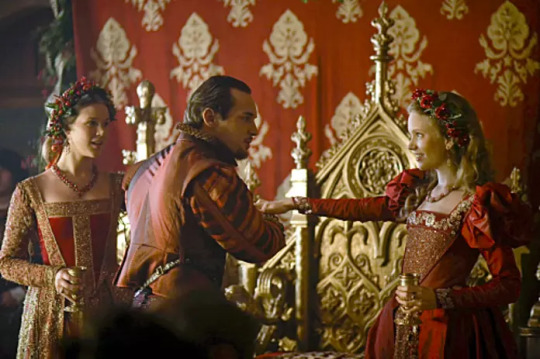
SEASON 7 (1542-1547)
The season starts off with Kateryn Parr loosing her second husband and getting to know Thomas Seymour and falling in love with him. However she is quickly noticed by an again Henry, and has to be his sixth wife and also hiding her faith. Anna von Kleve visits regularly throughout the season too. Henry goes to war and Kateryn Parr has to watch over the children. Once again like Jane, Kateryn is very frightened to be beheaded and Anna tries to calm her down, saying everything will be alright. However, Gardner starts to find that Kateryn is a Protestant and he tries to show that to Henry VIII. he kills Anne Askew too. Kateryn is shaking in her boots now and Henry starts to hear these claims and almost arrests her. However, she is lucky and tells him how thankful she is that he is teaching her his ways of religion. Henry becomes more sick and Kateryn becomes somewhat of a nurse for him. Charles Brandon dies and Henry starts seeing visions of he people that he killed or died throughout his life. The season ends just like how the show ends, but Anna von Kleve is there.
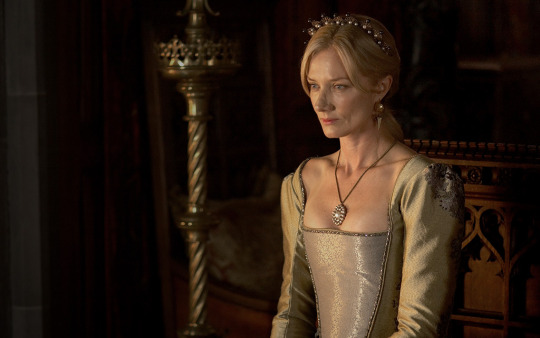
This is how I will change it! I might do even smaller portions focusing on each season on my take of what The Tudors should of done. what are your thoughts?
#the tudors#Katherine of Aragon#anne boleyn#jane seymour#Anna von Kleve#Anne of Cleves#katheryn howard#katherine parr#kateryn parr#thomas cromwell#King Henry VIII
72 notes
·
View notes